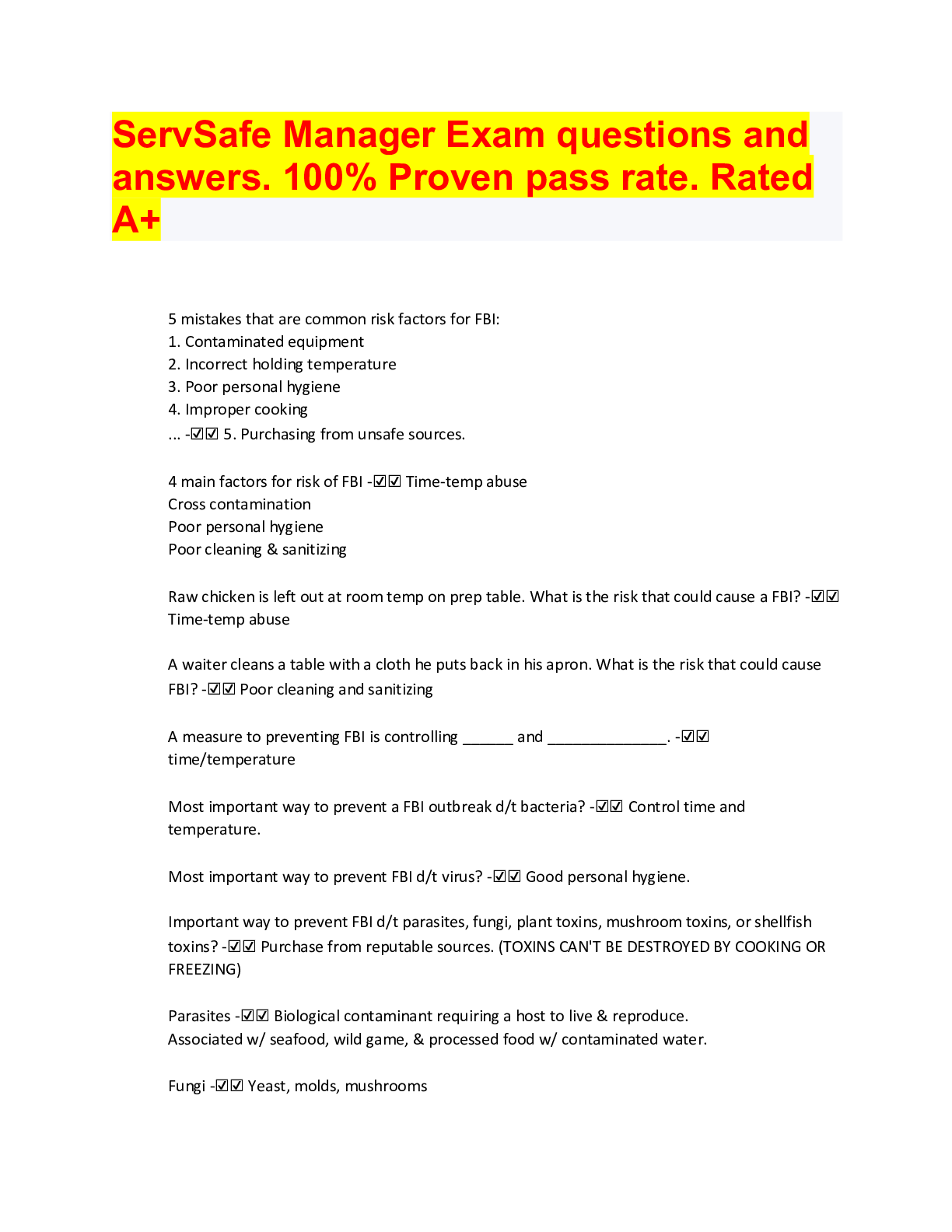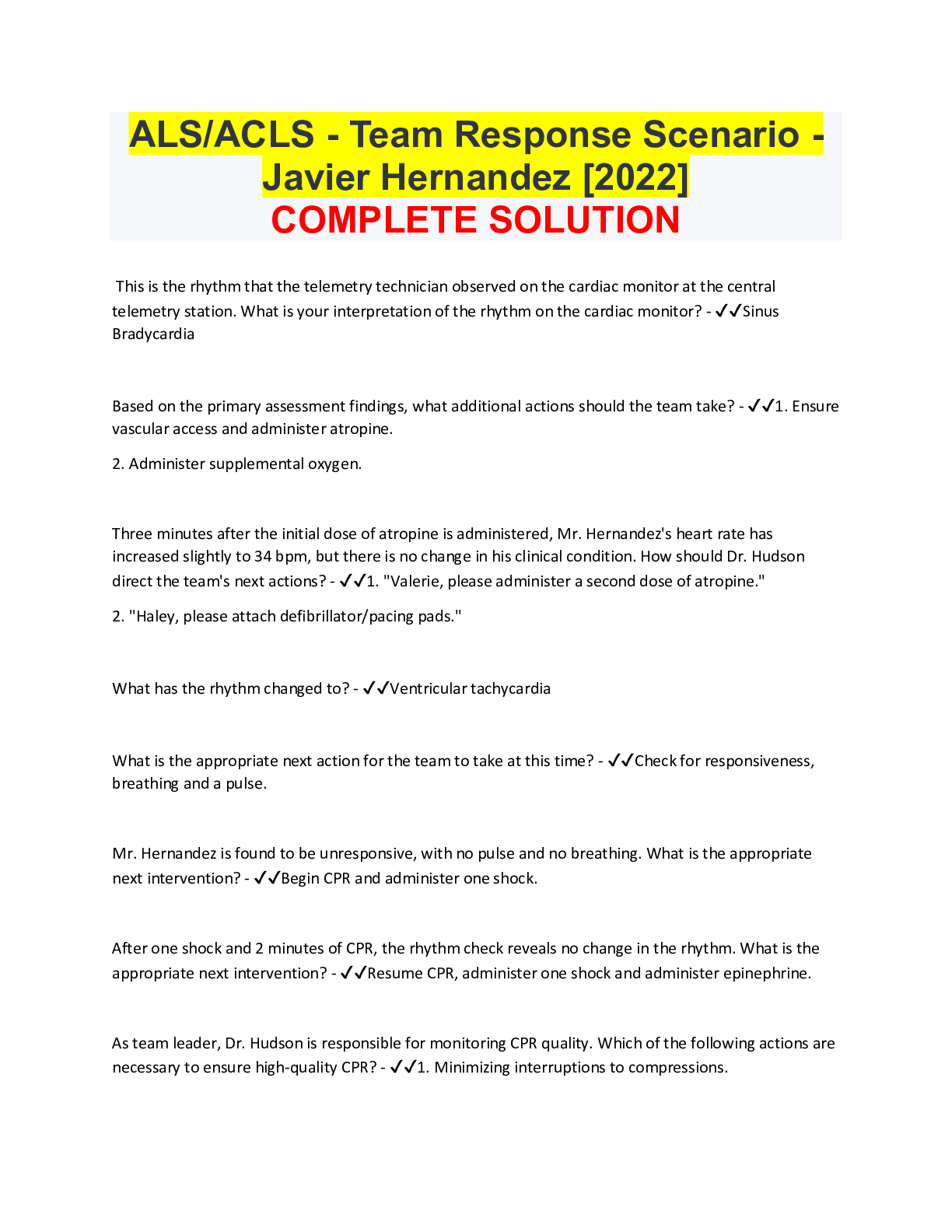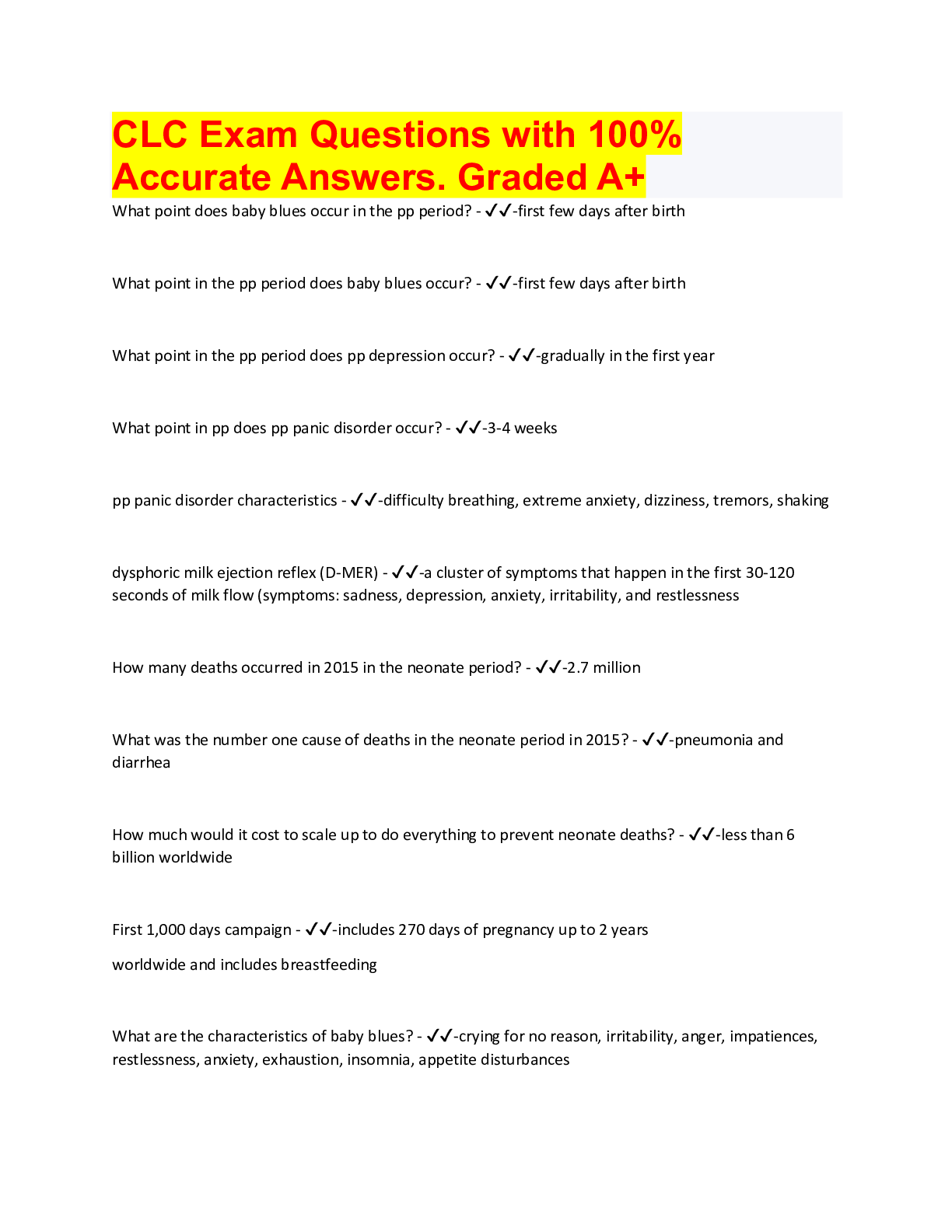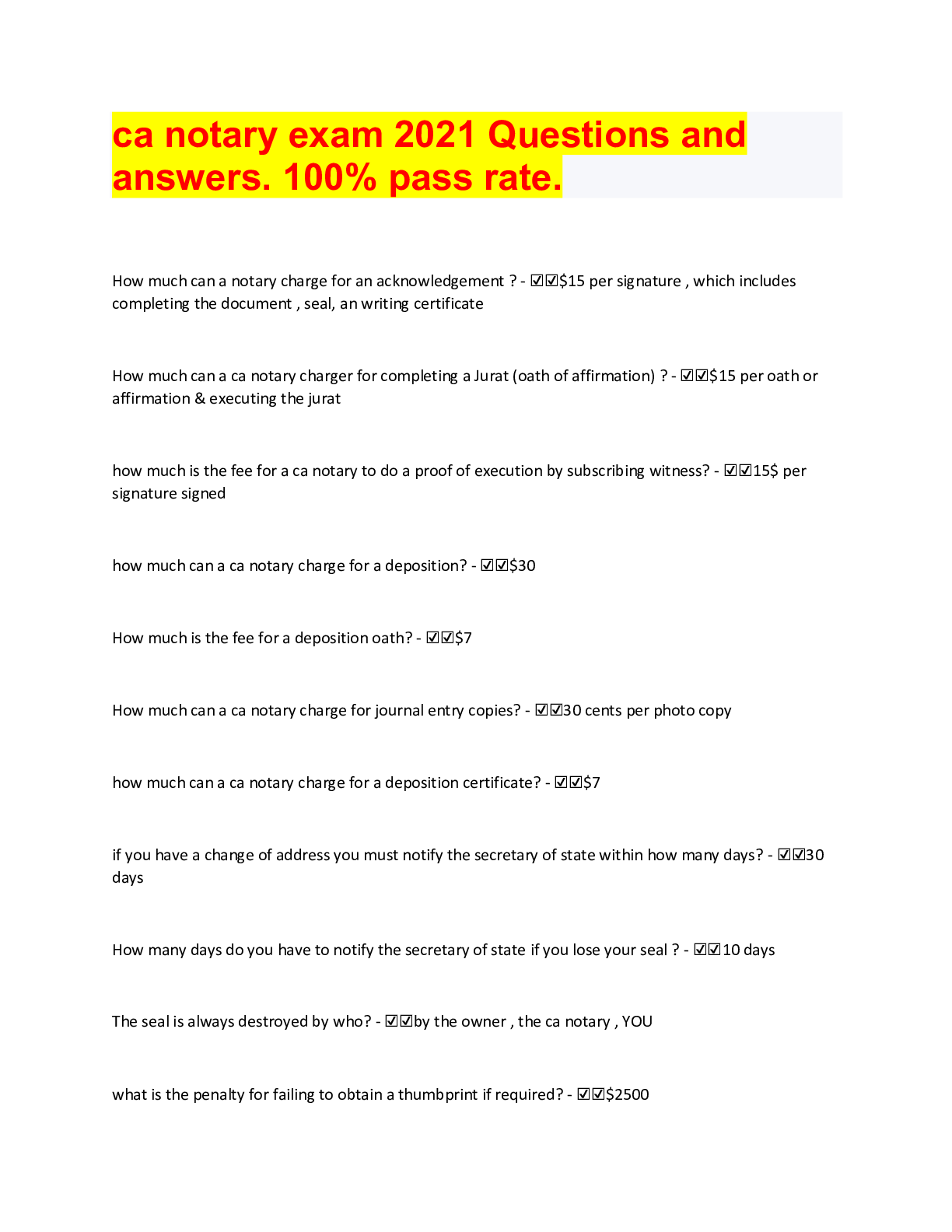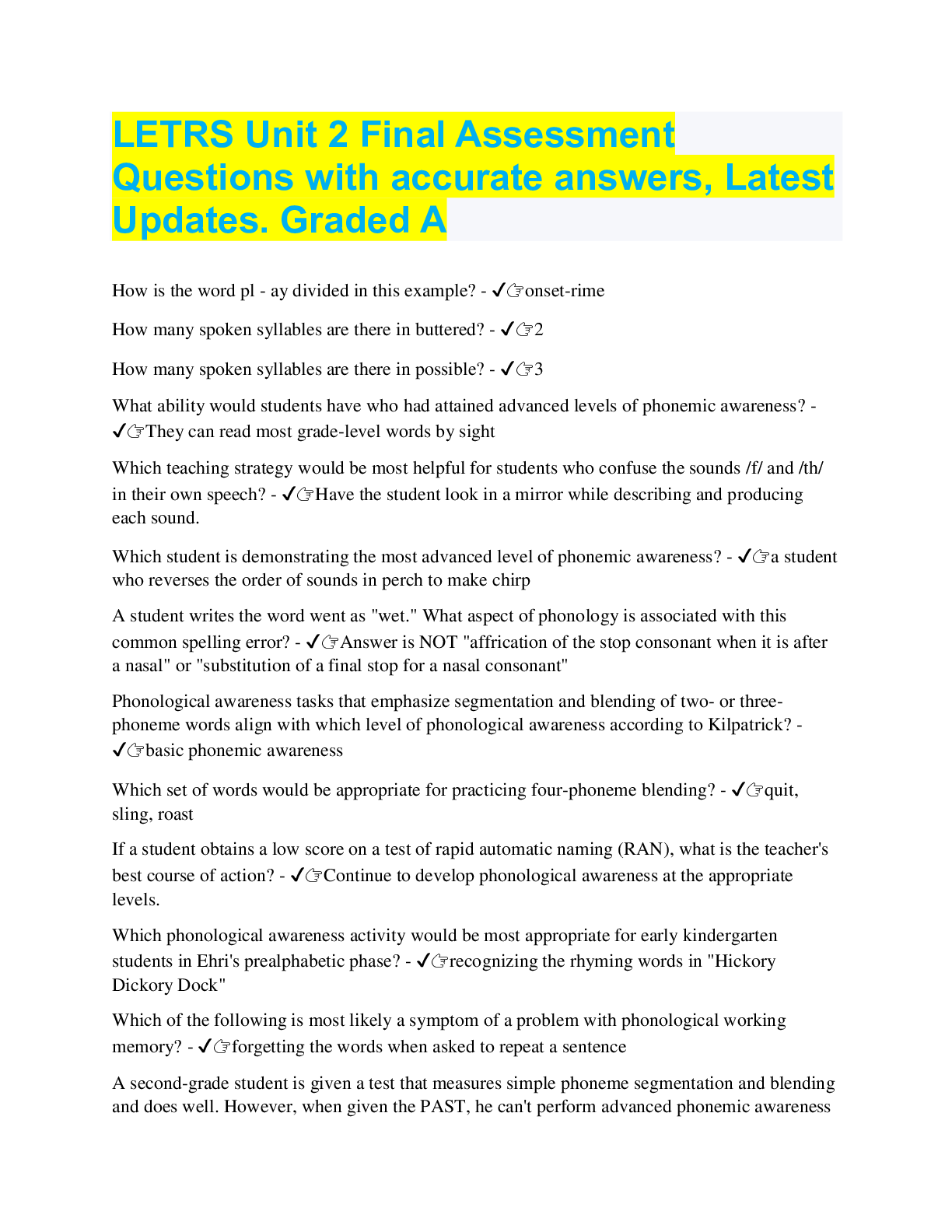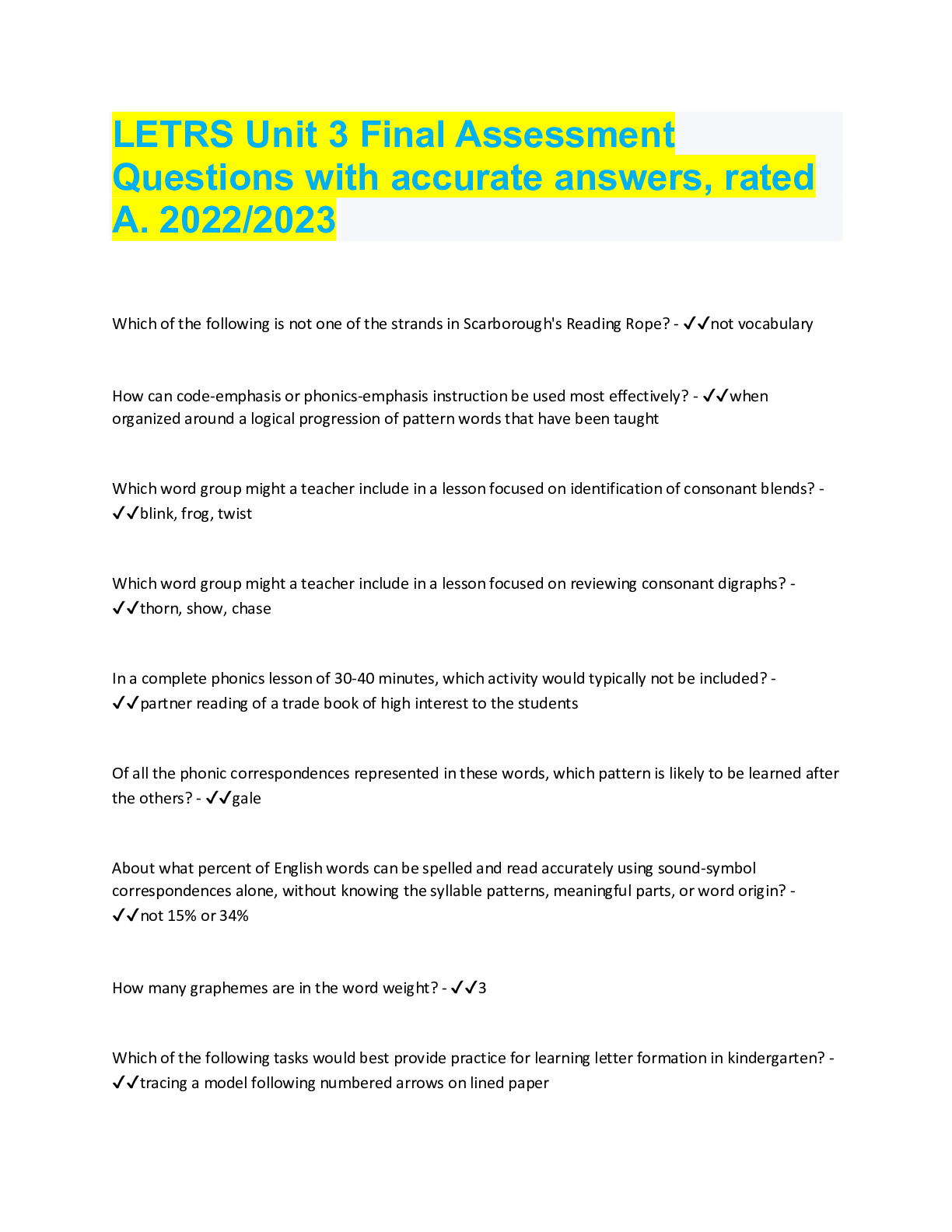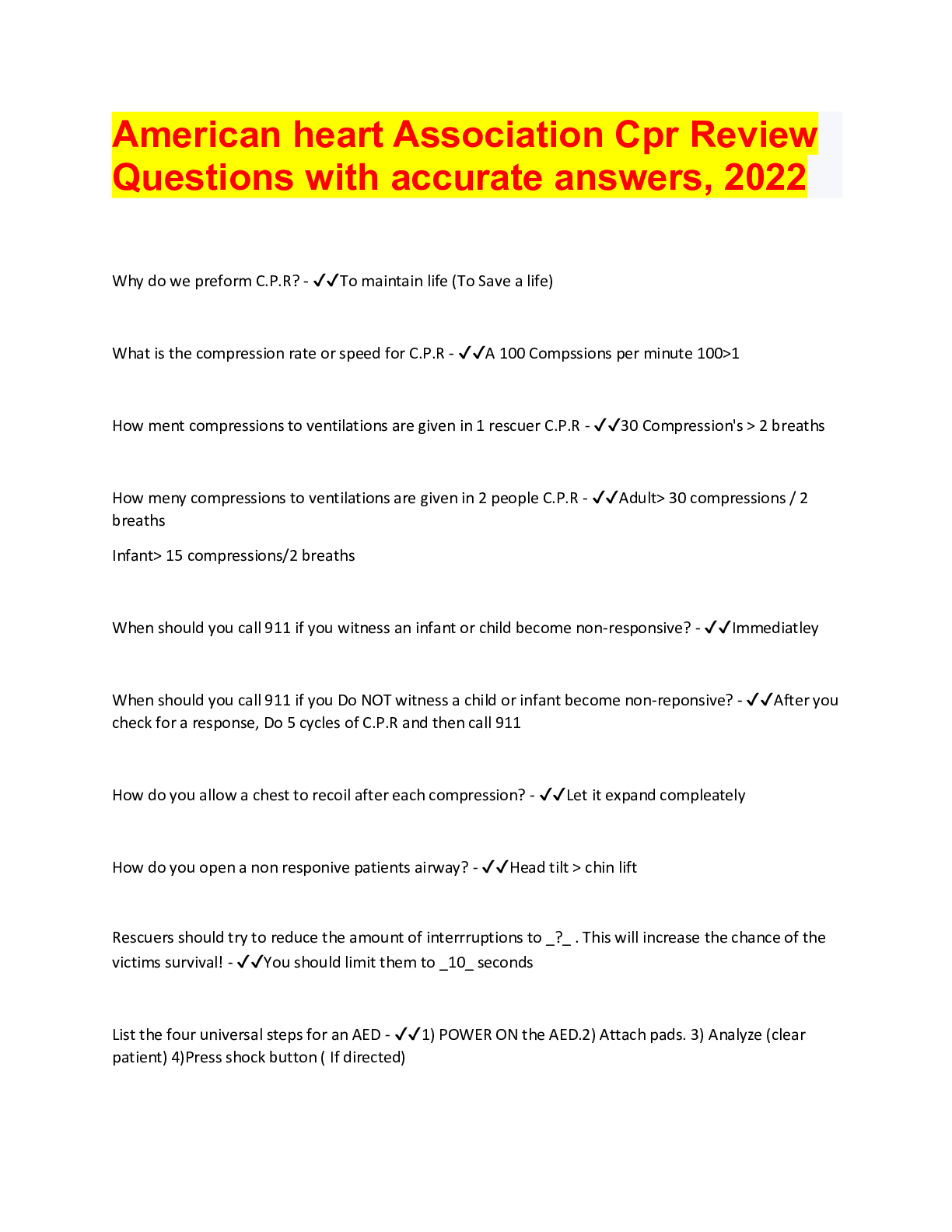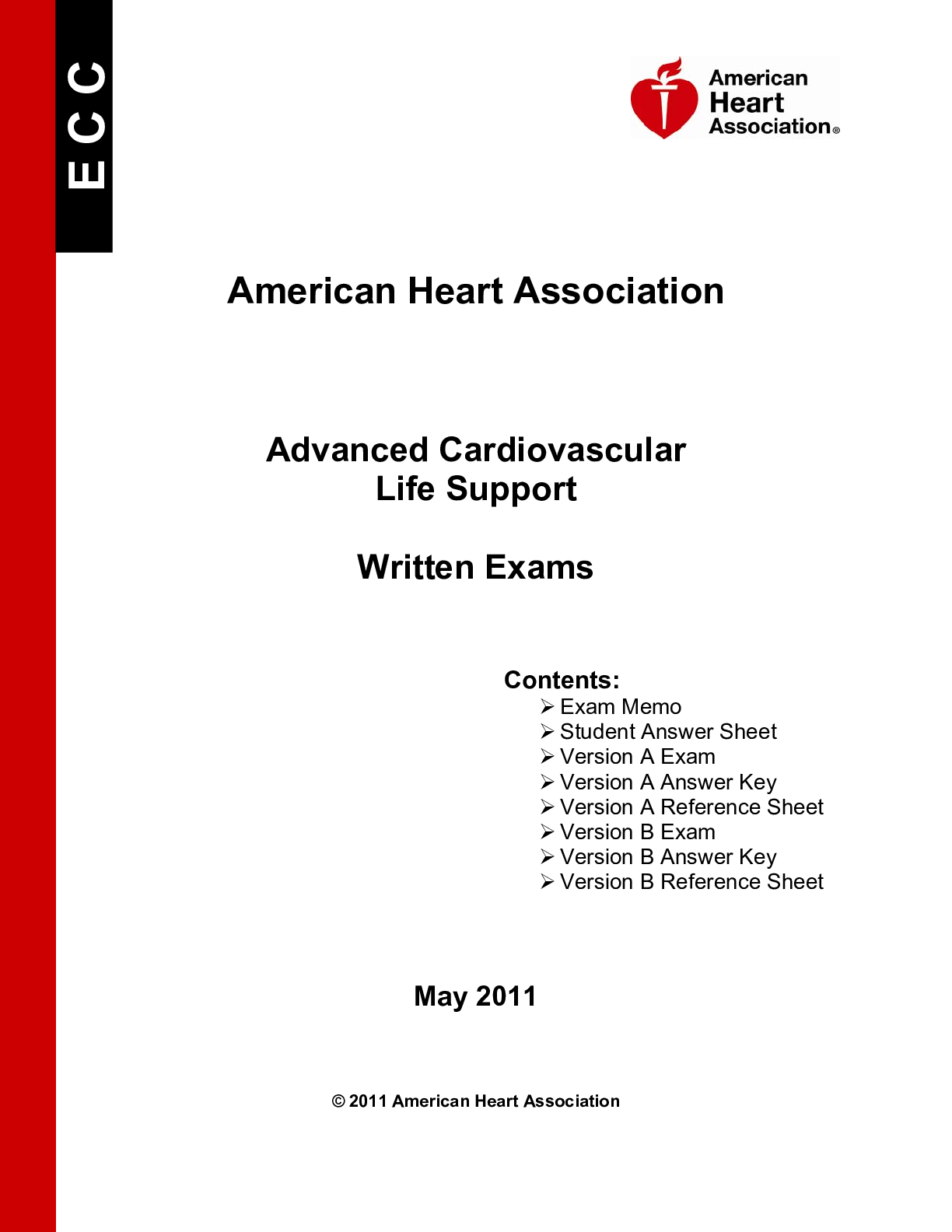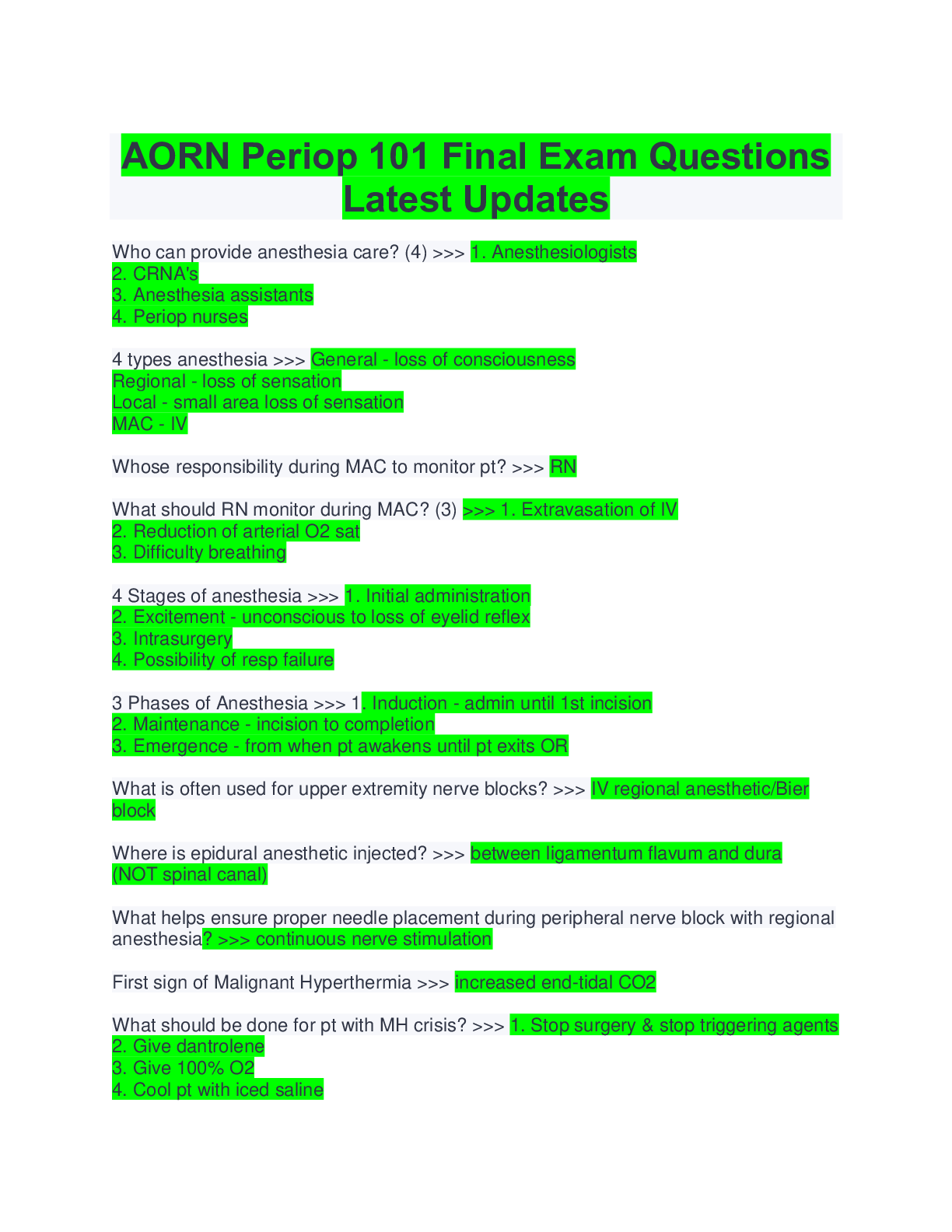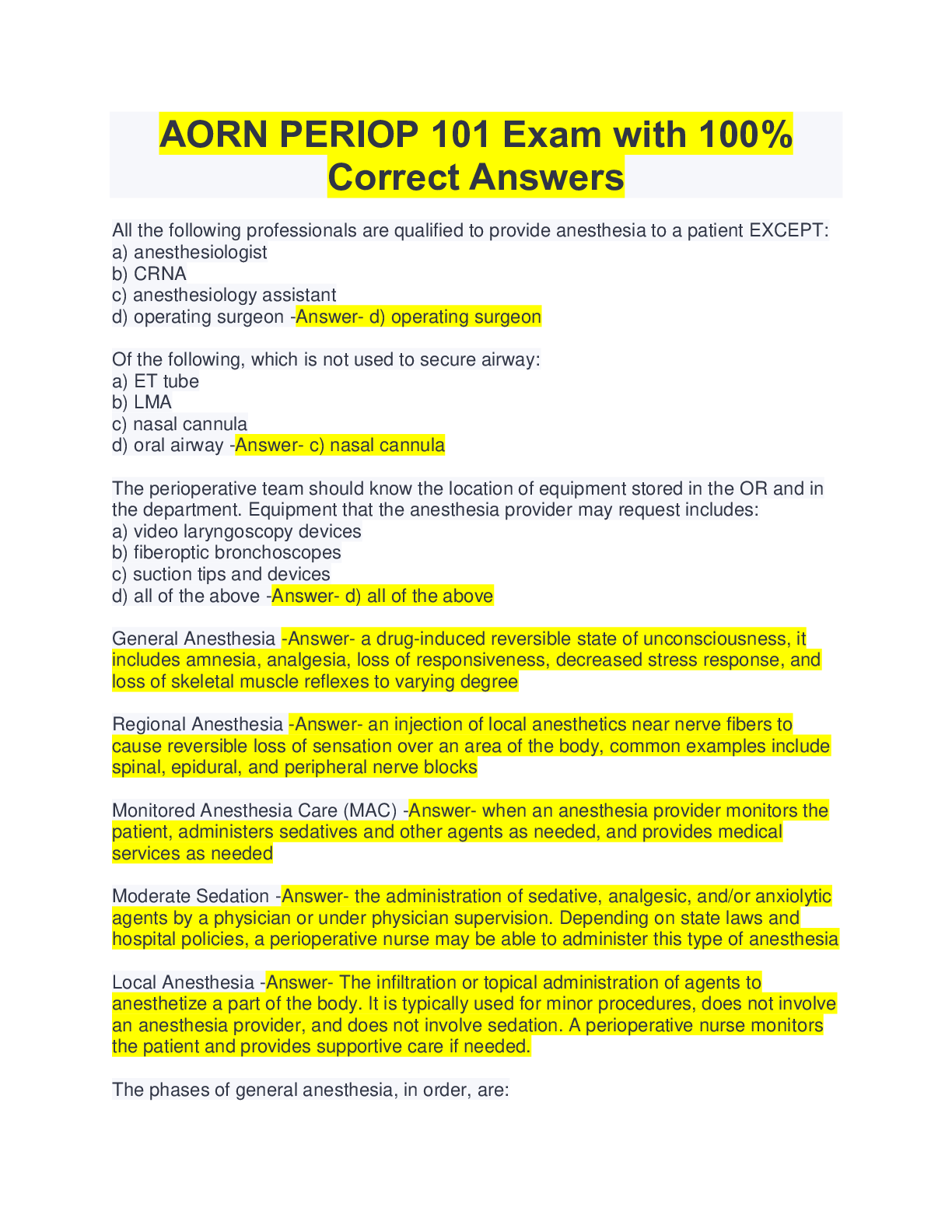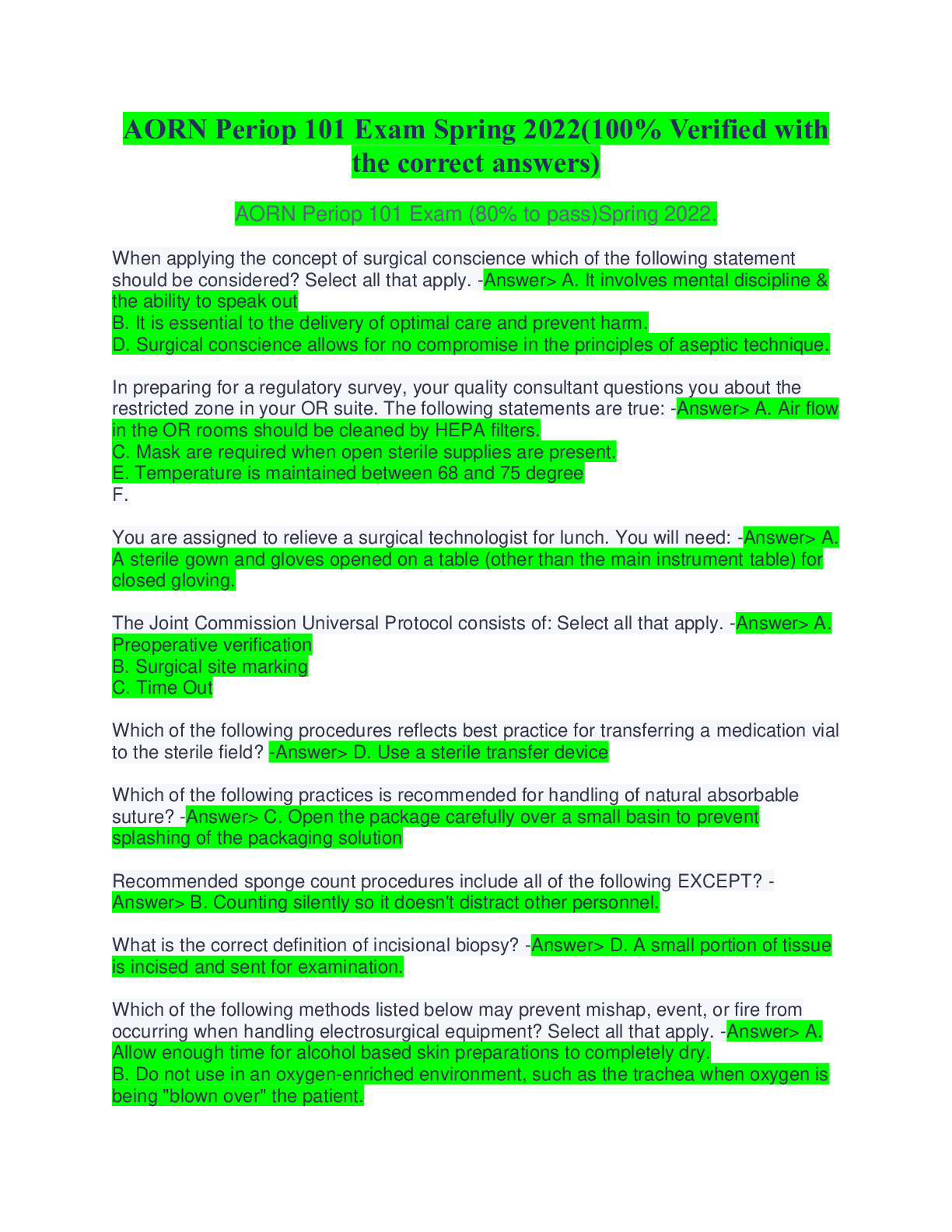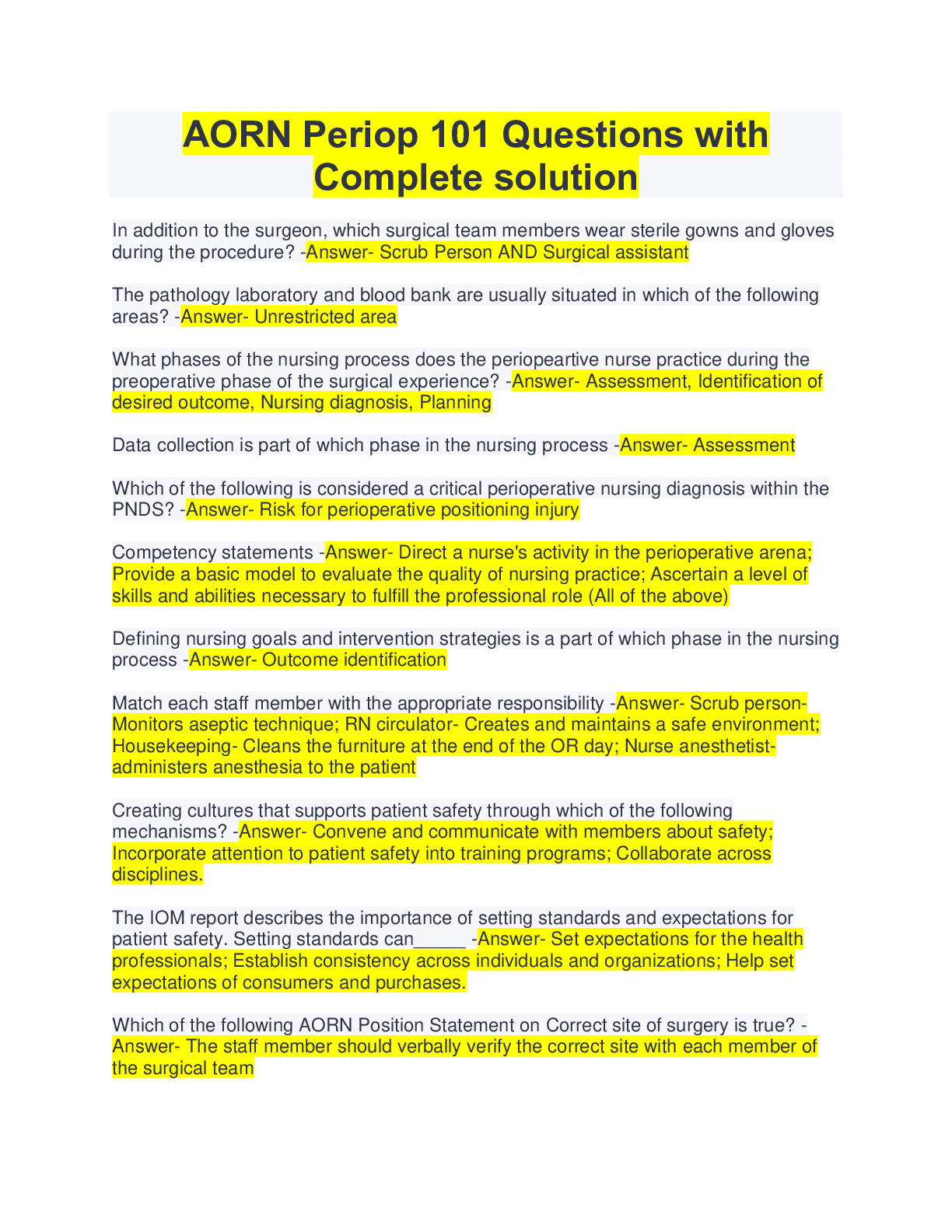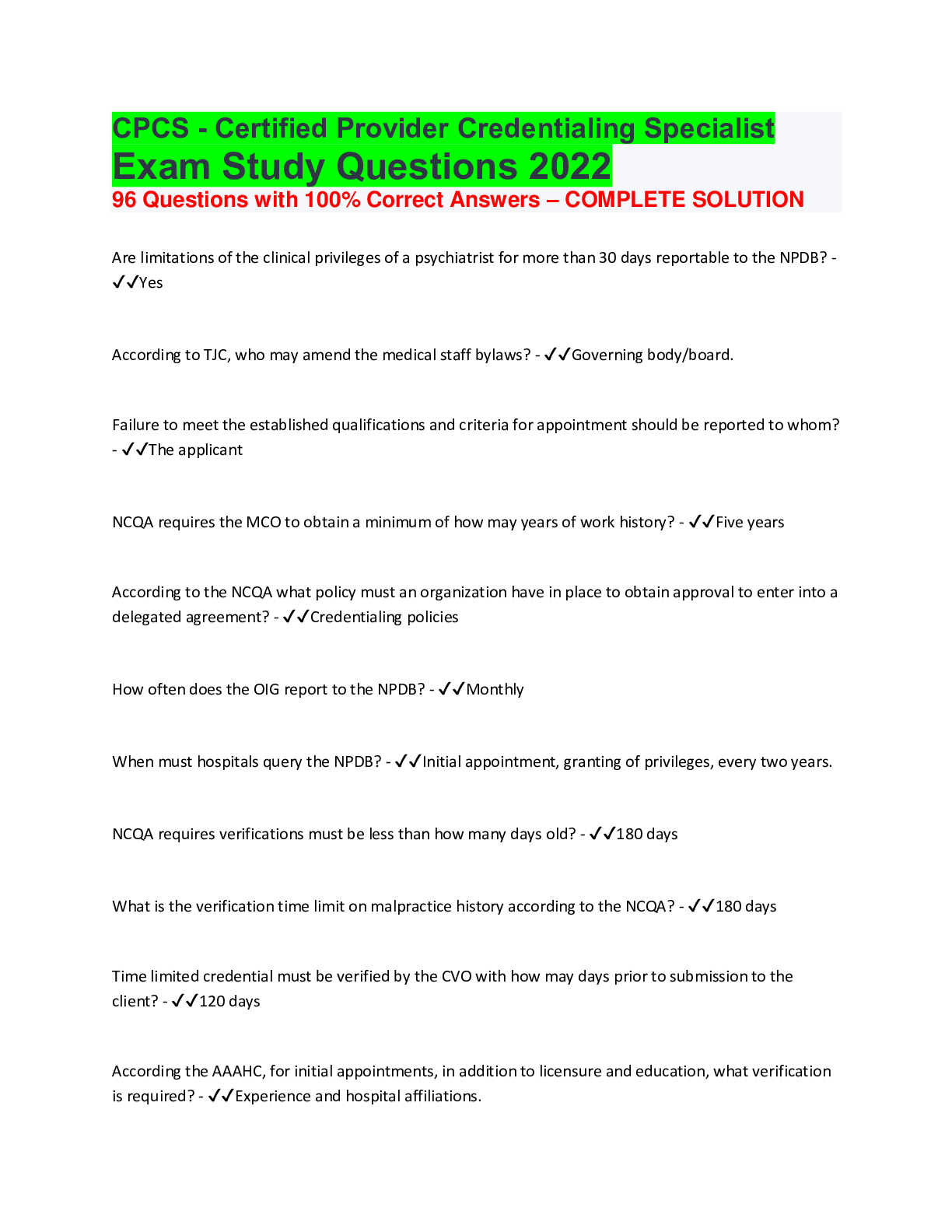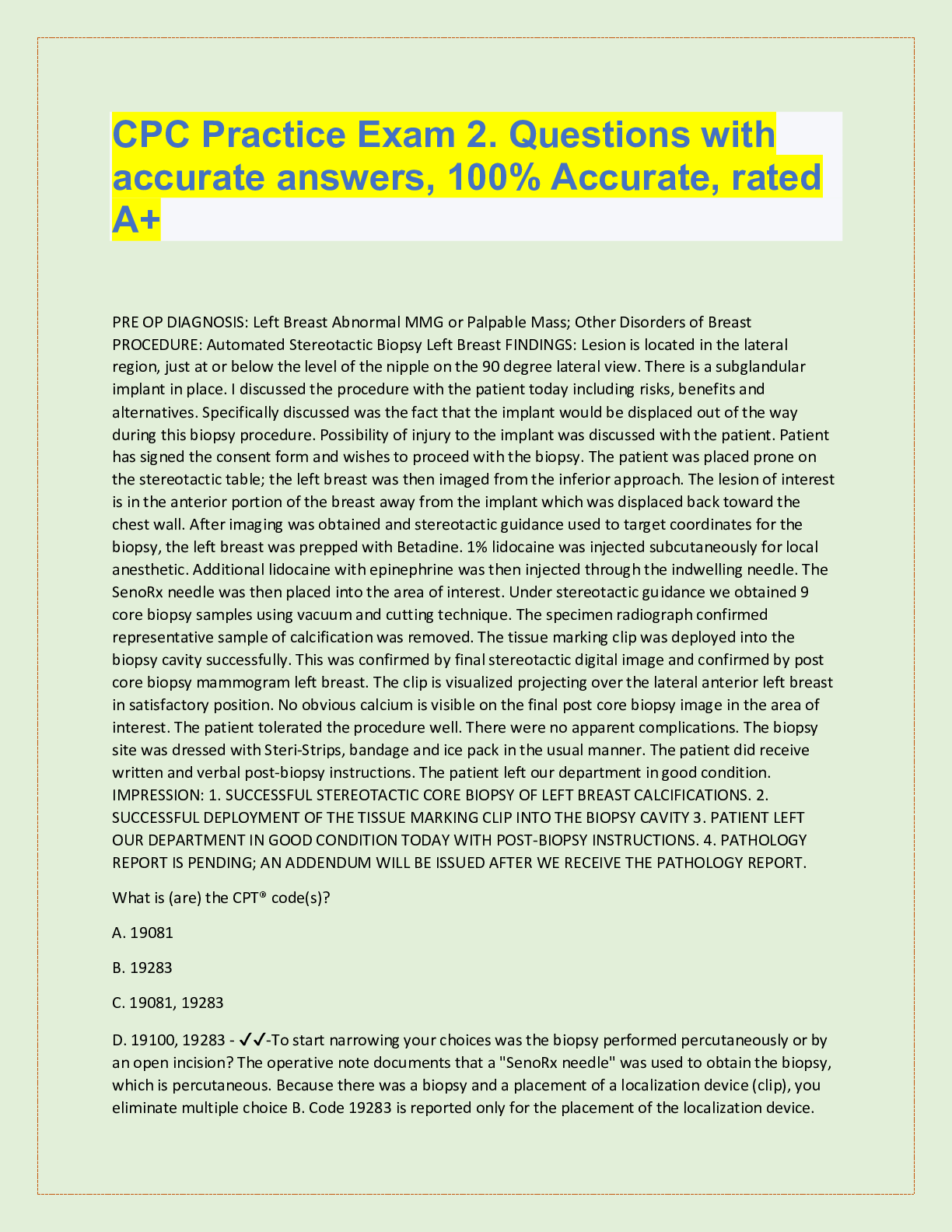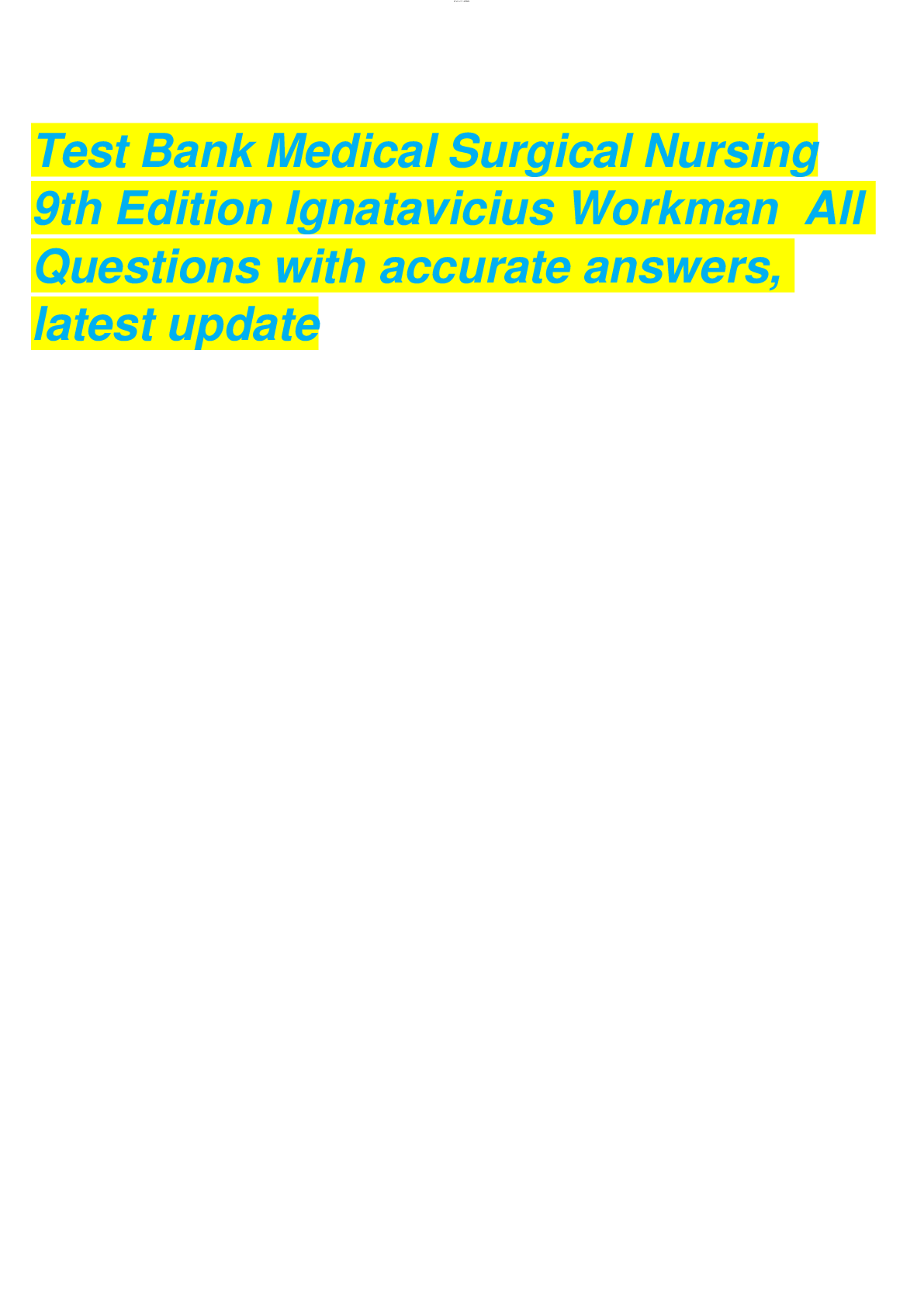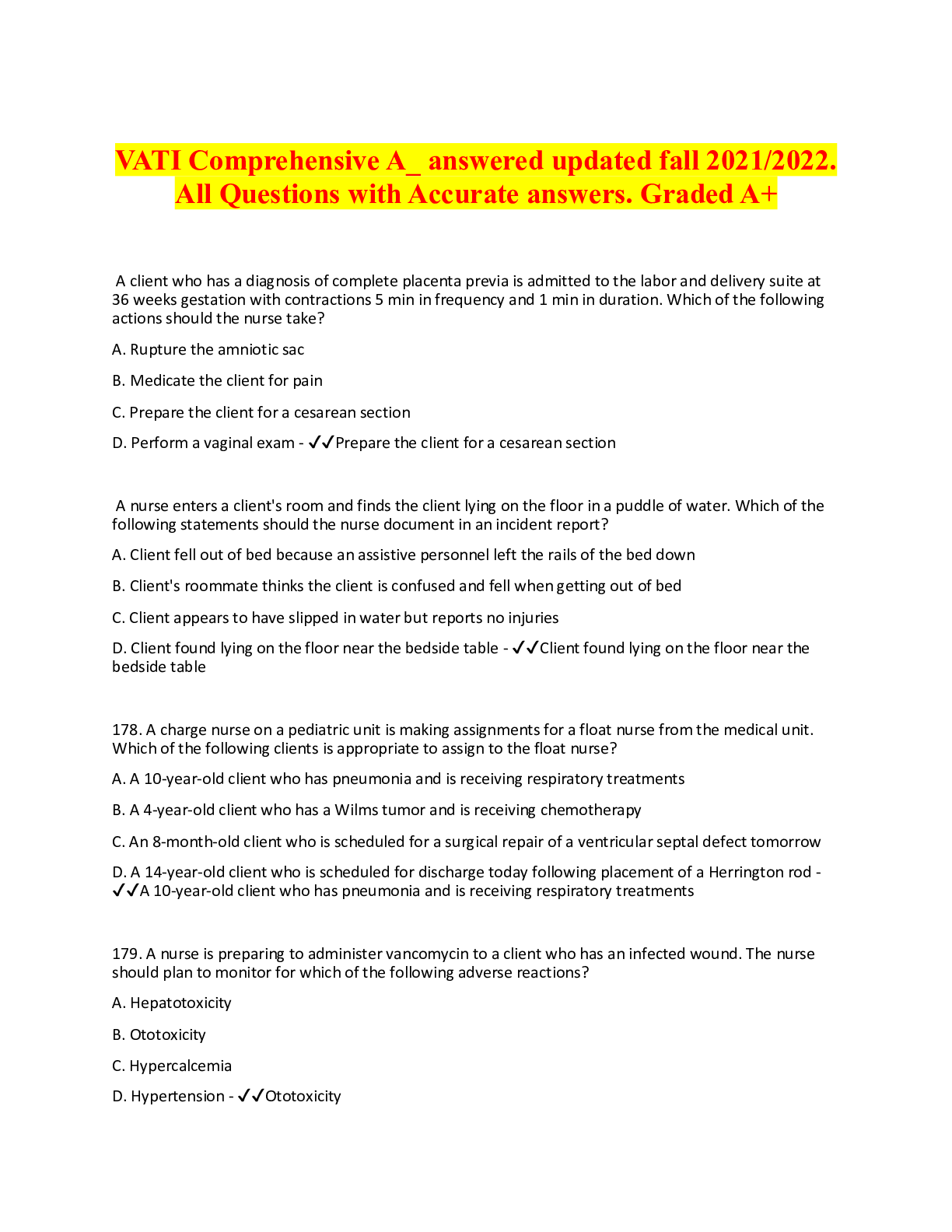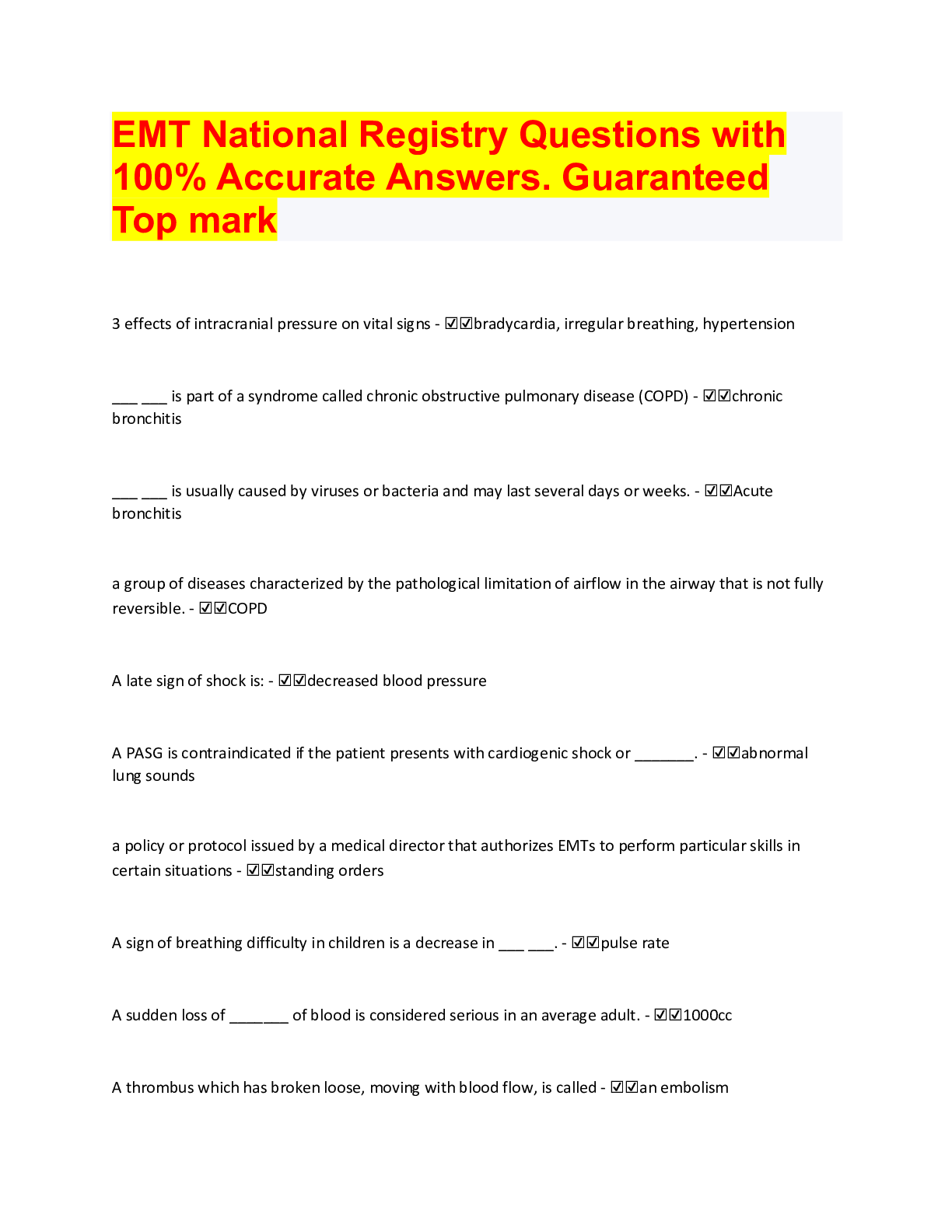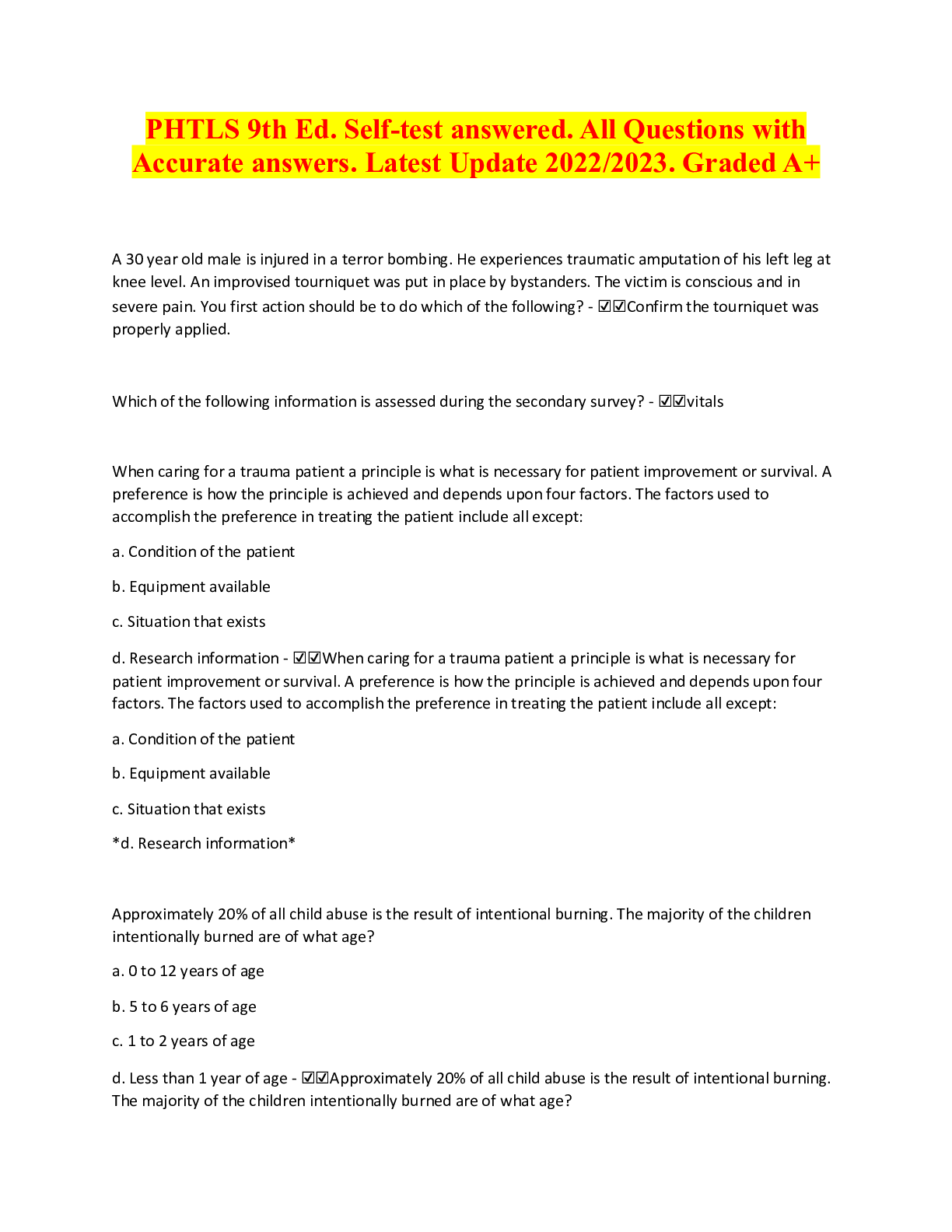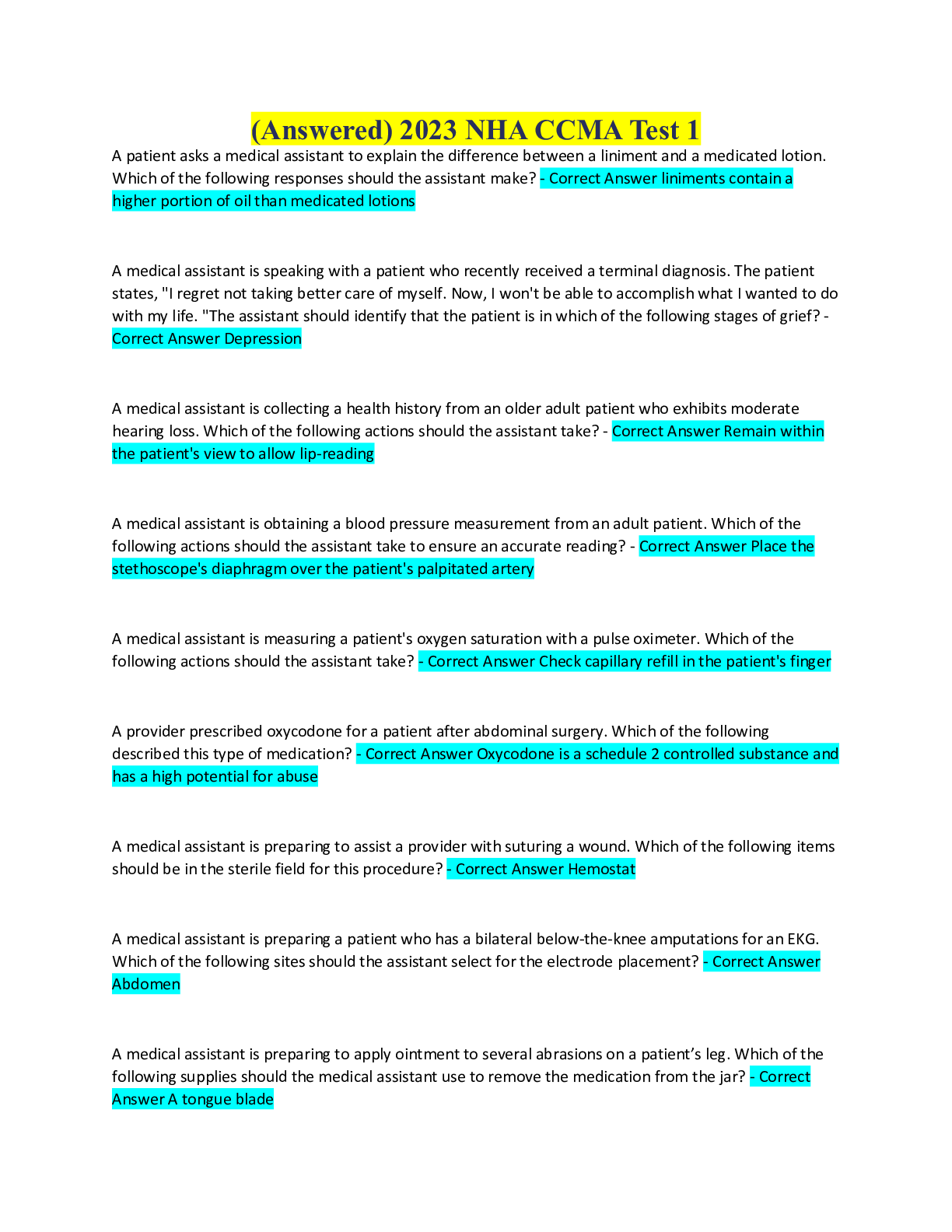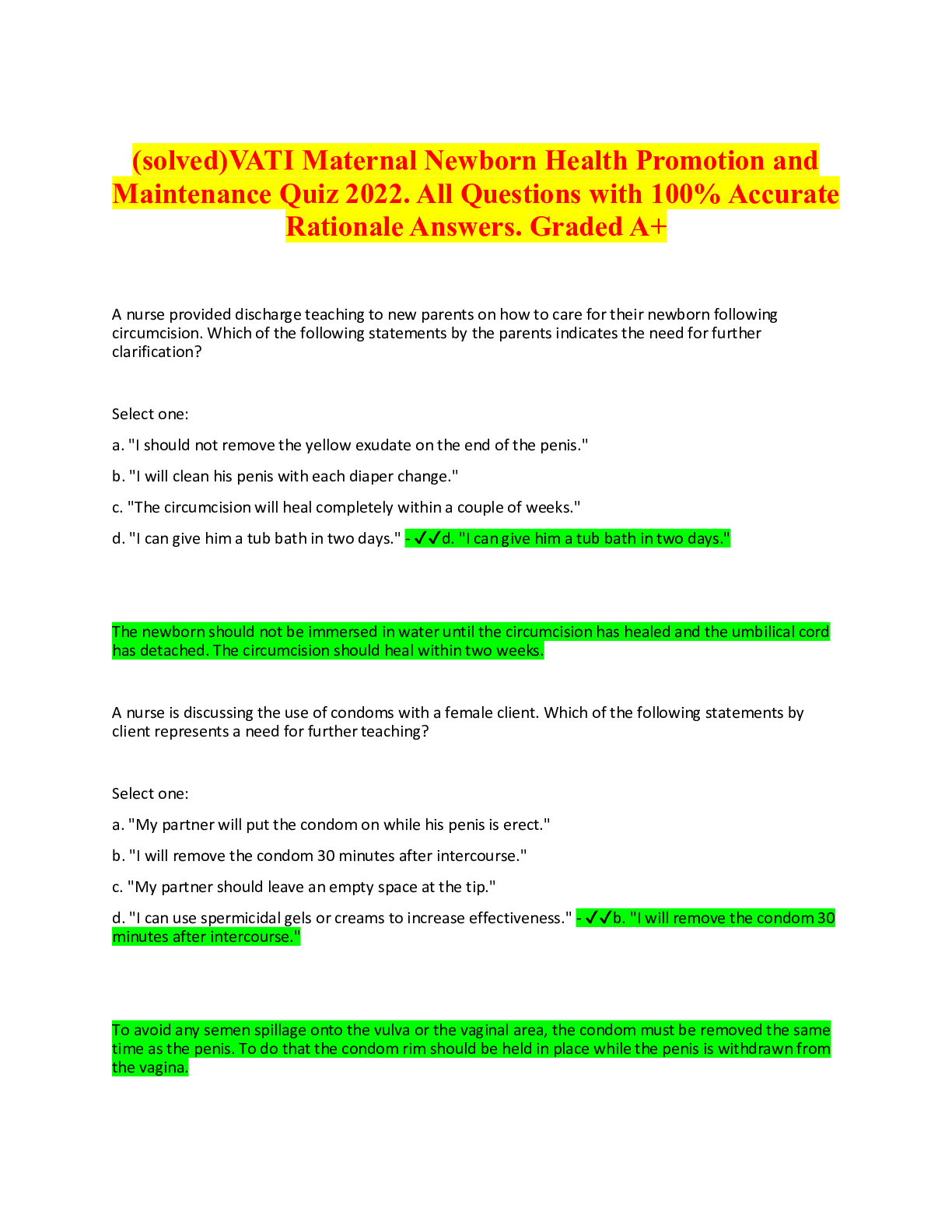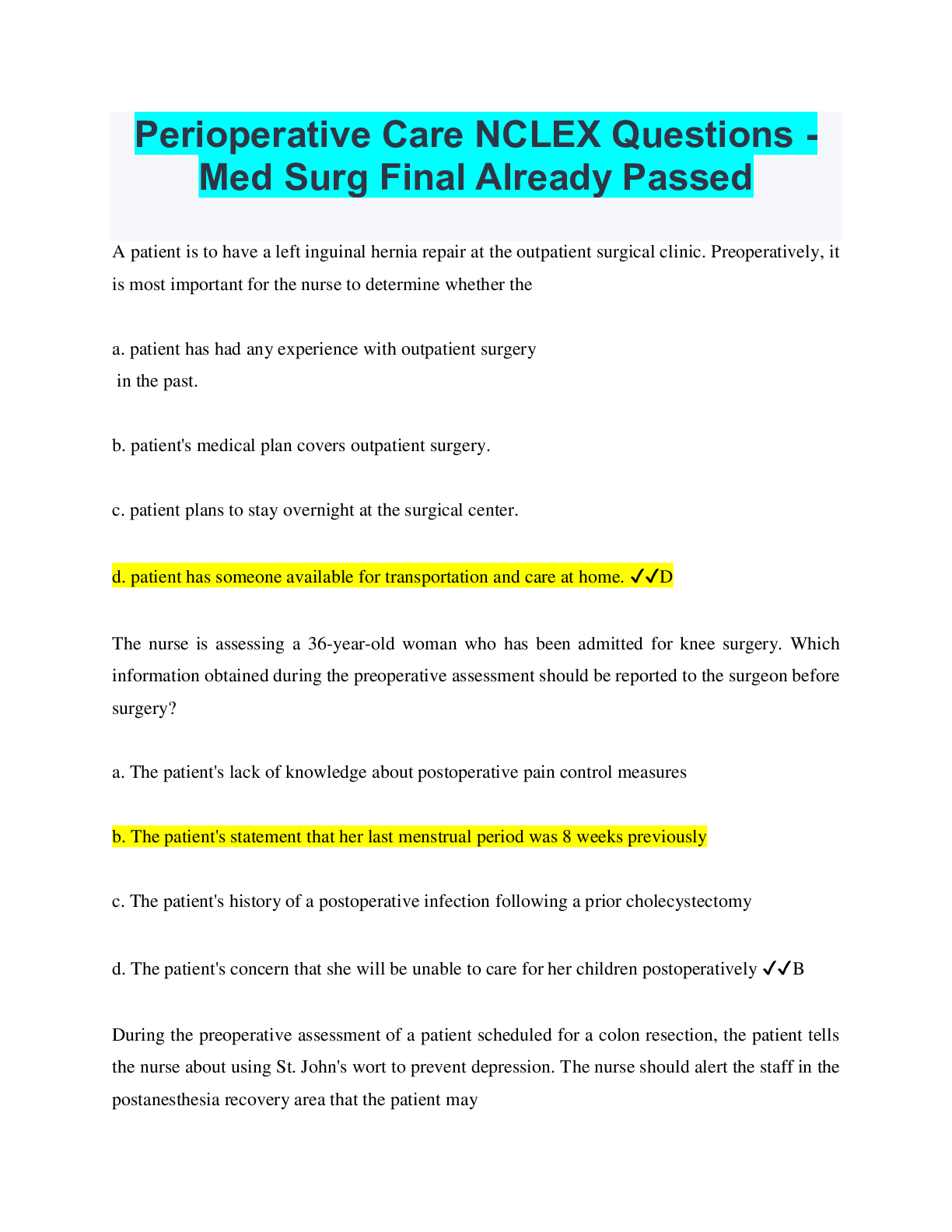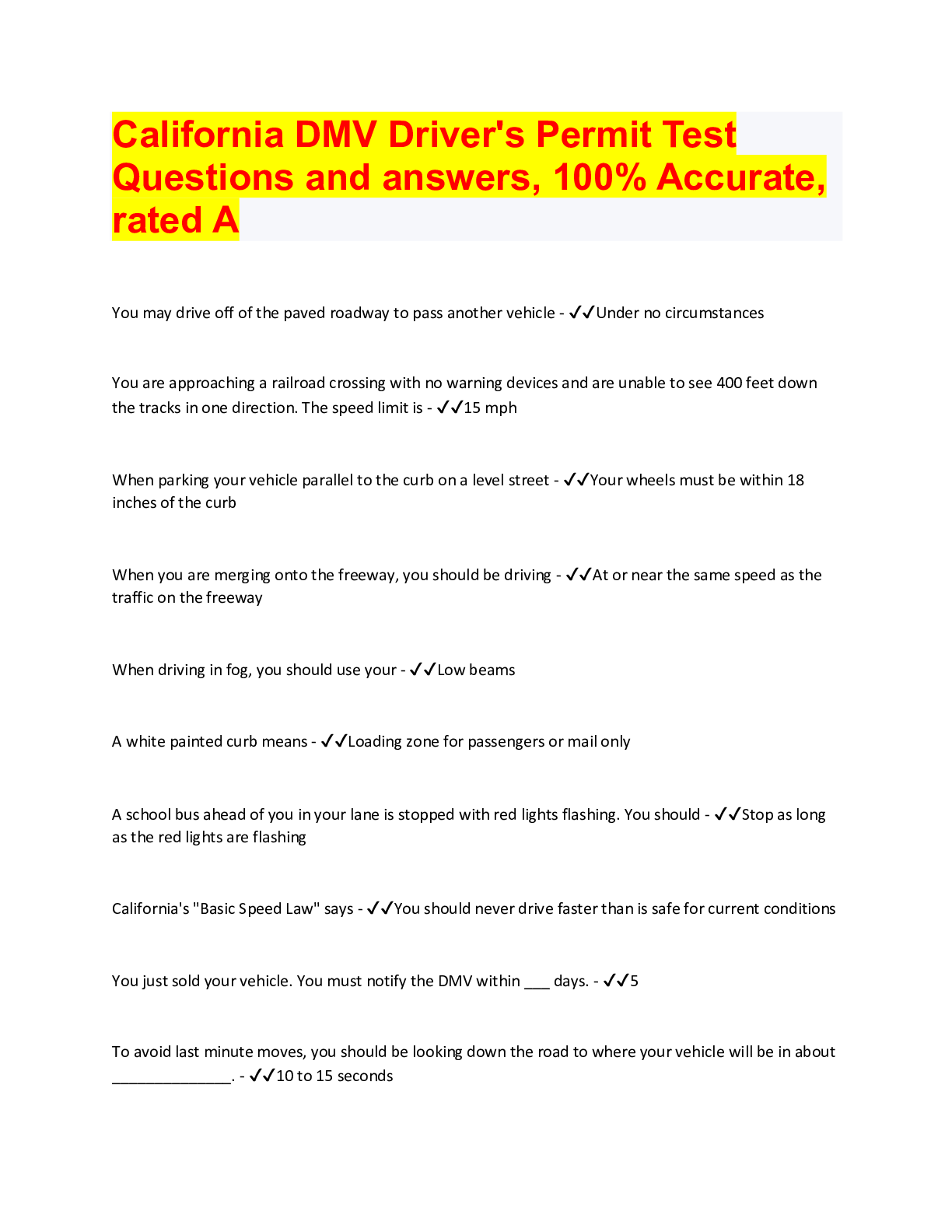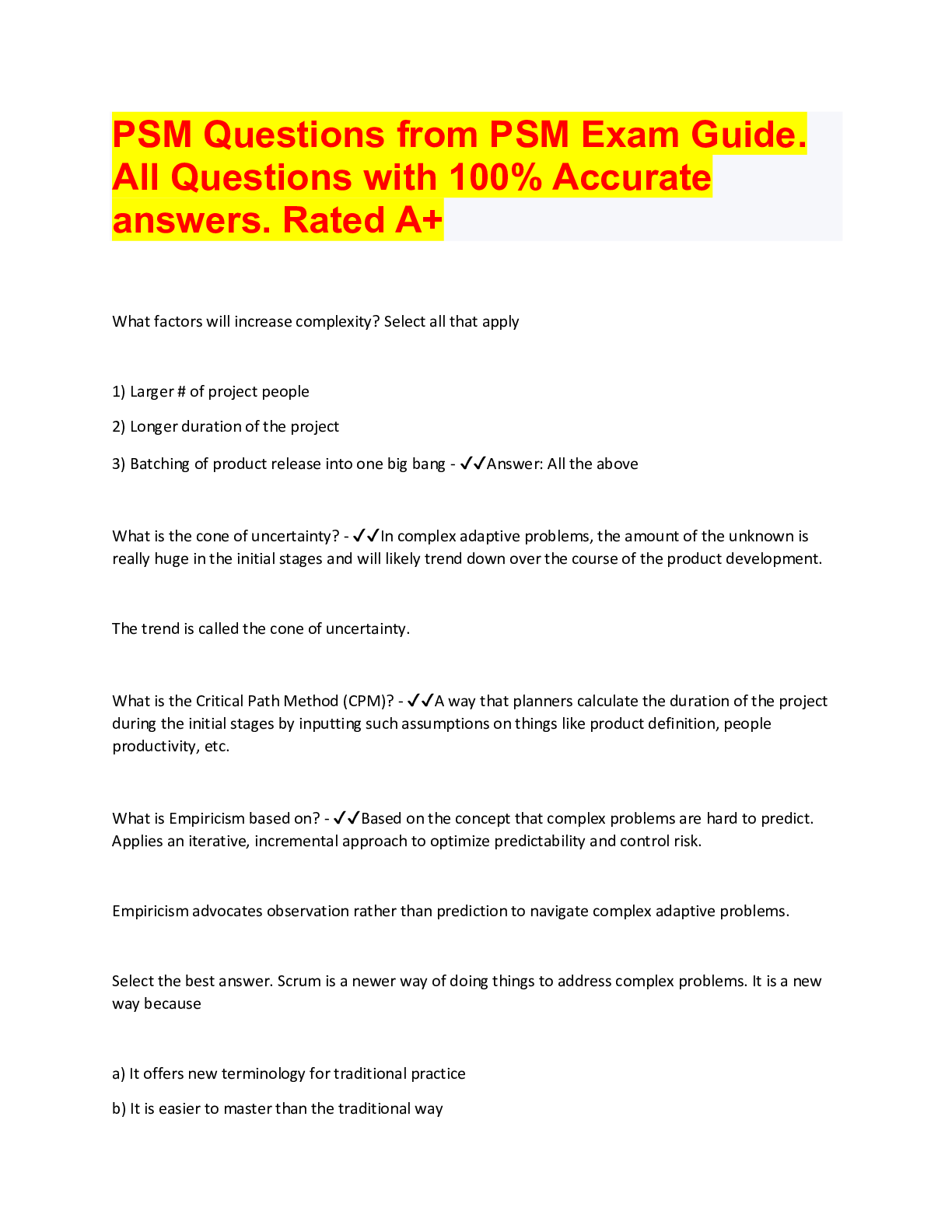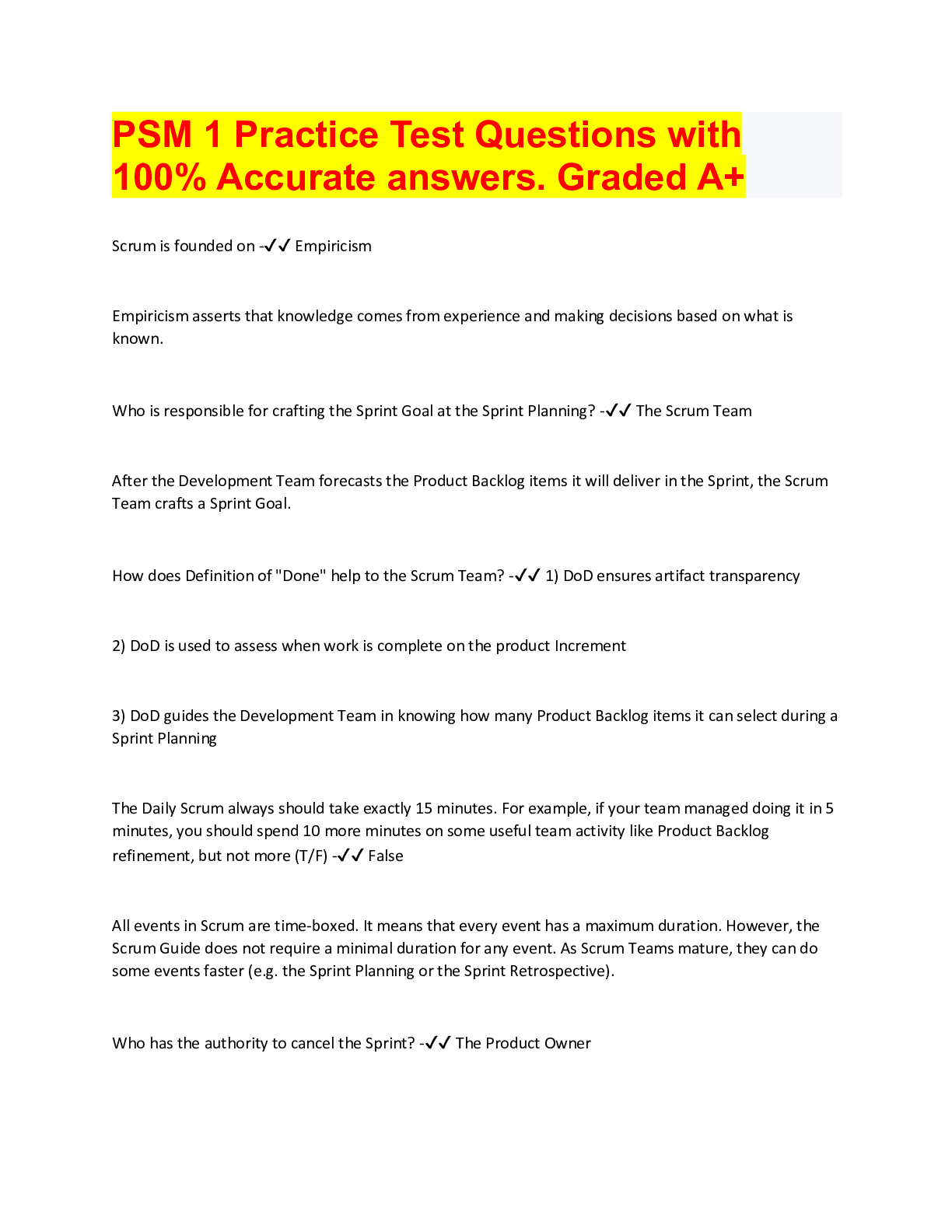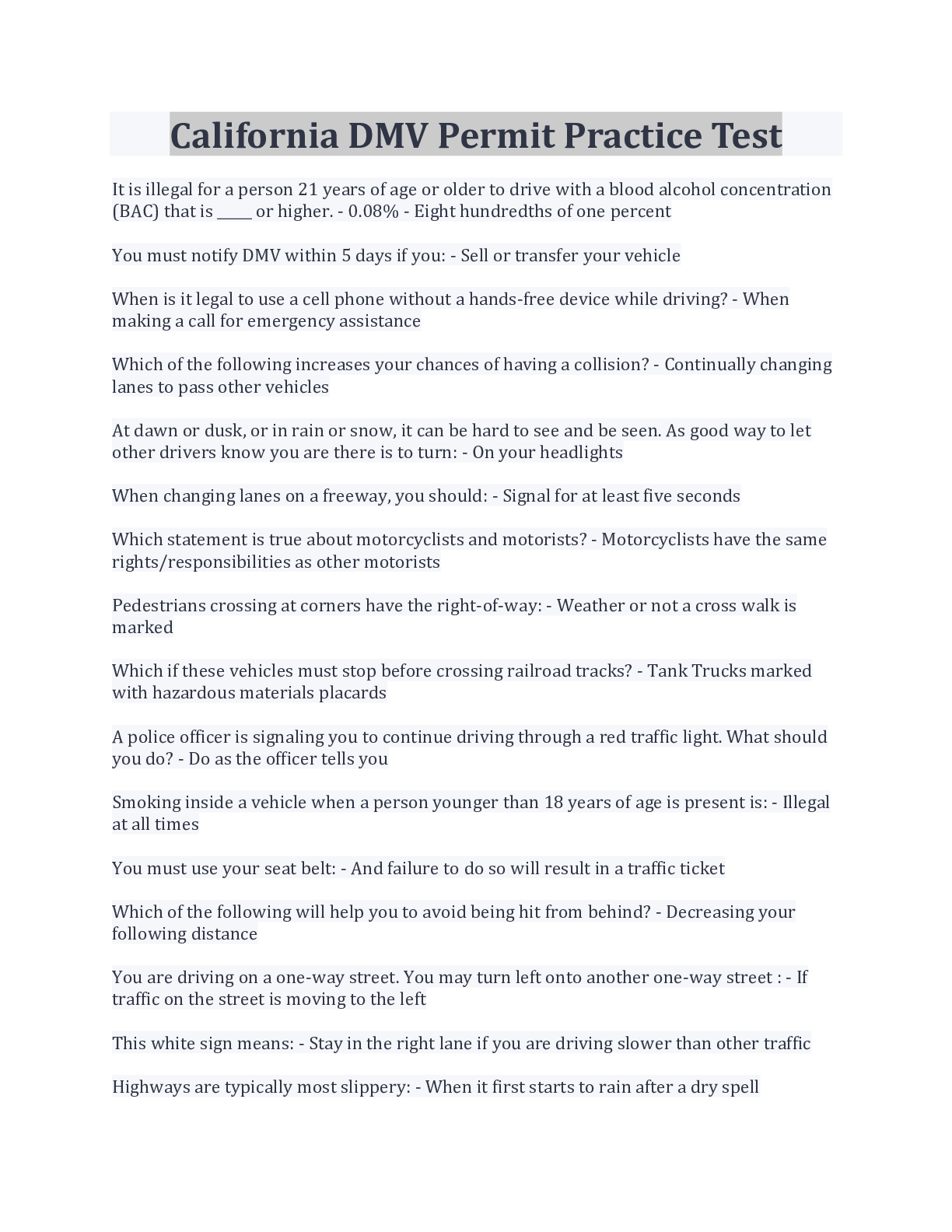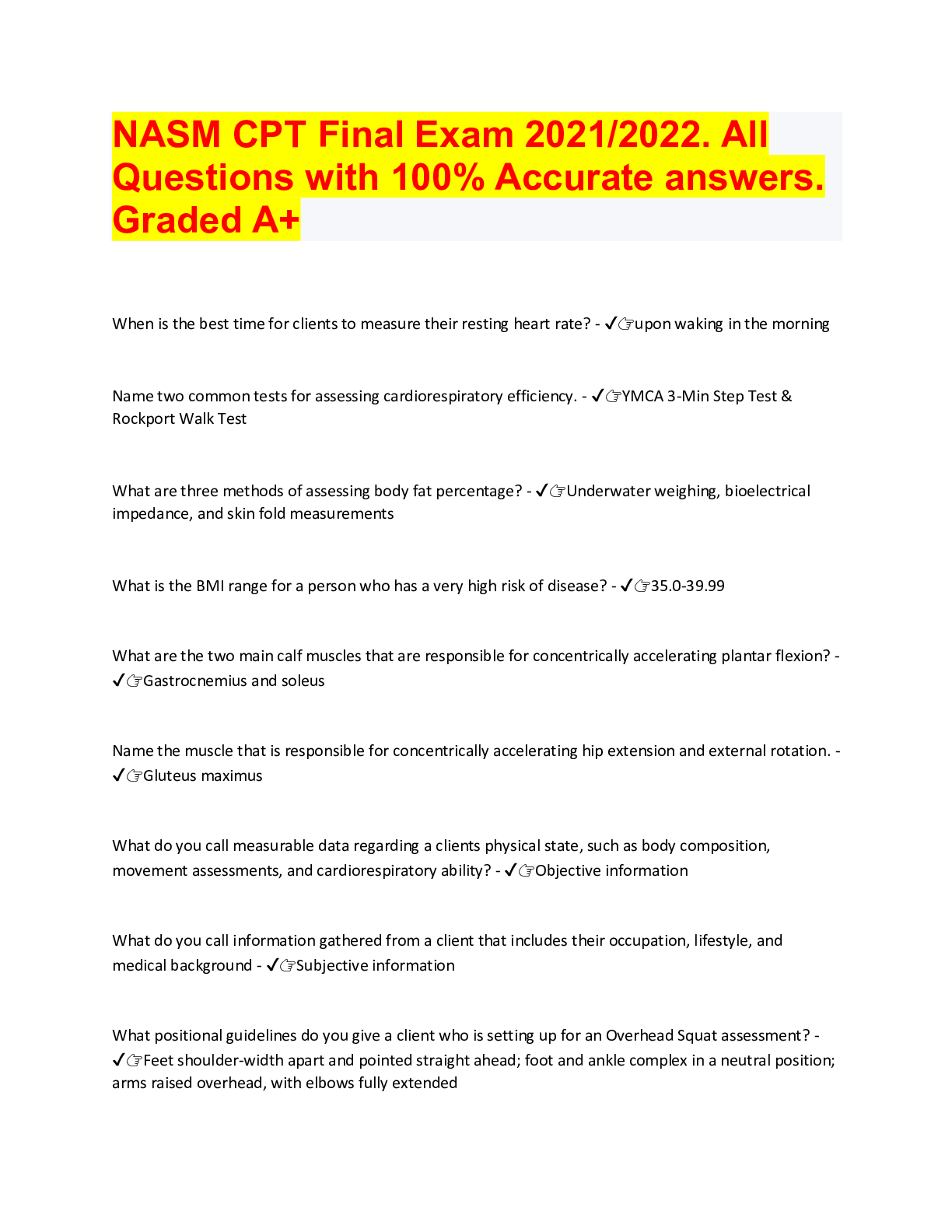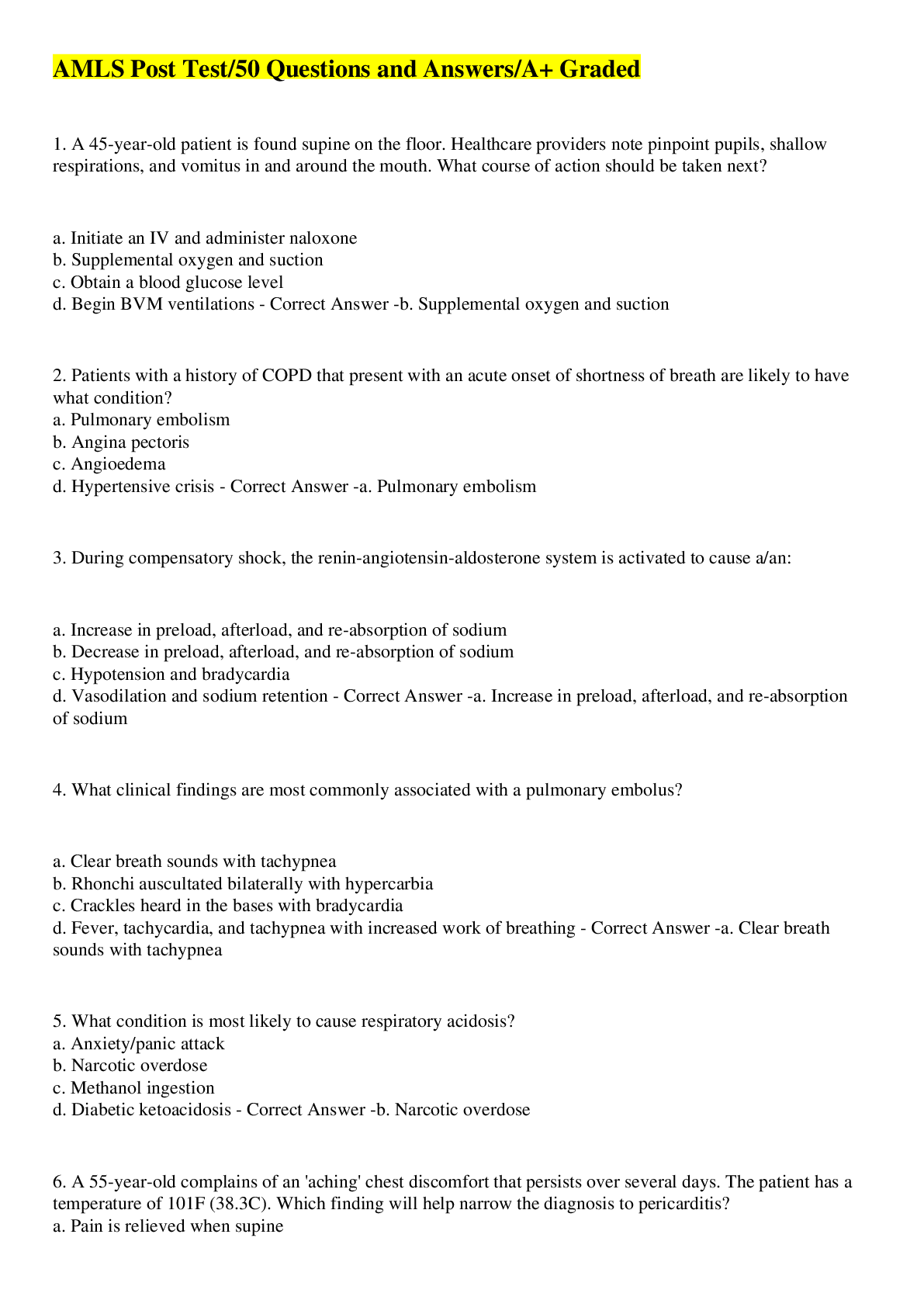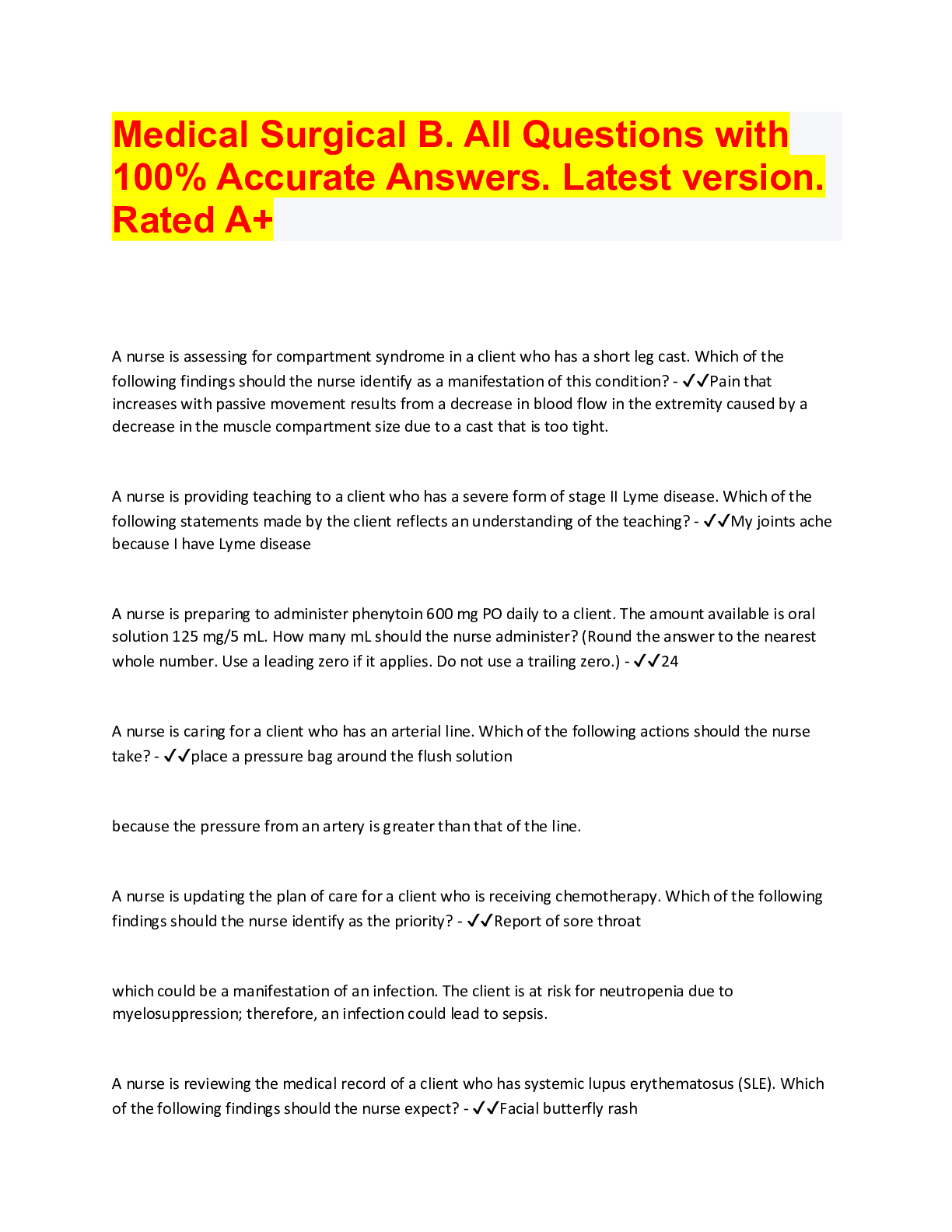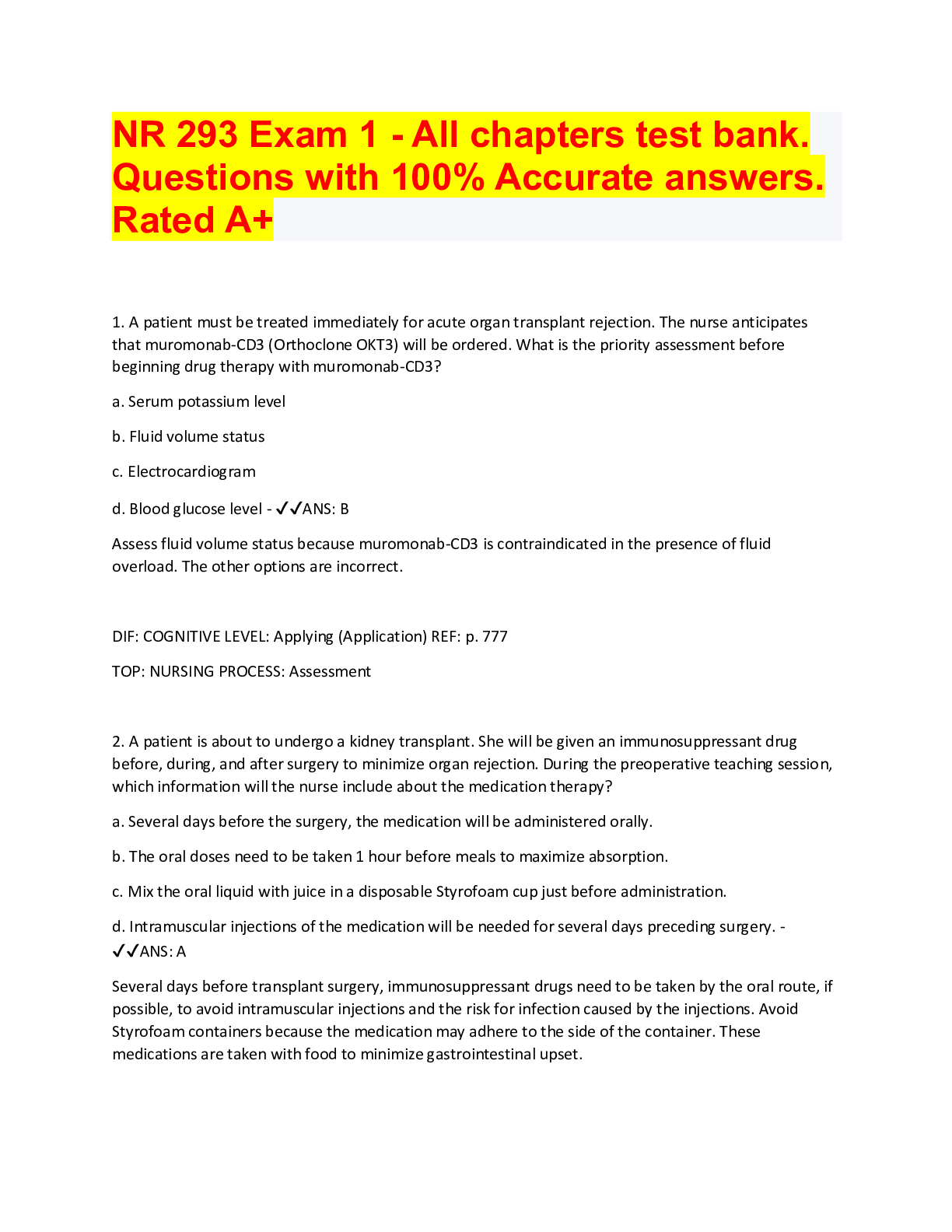*NURSING > QUESTIONS & ANSWERS > Ethical/Legal, Answered. All Questions with 100% Accurate Answers. Graded A+ (All)
Ethical/Legal, Answered. All Questions with 100% Accurate Answers. Graded A+
Document Content and Description Below
The nurse is caring for a 4-year-old child in the emergency department who has a 104 F (40 C) temperature, is obtunded, and has a positive Kernig's sign. The parents are refusing antibiotics and any t... reatment. The parents state that their religious belief is to trust in just prayer and believe the child will receive divine healing. What action does the nurse anticipate? 1. Assisting the parents in signing Against Medical Advice (AMA) papers 2. Discharging the child if parents have power of attorney papers 3. Notifying the hospital administration about the situation 4. Reassuring the parents that their decision will be respected under the principle of autonomy - ✔✔3. Notifying the hospital administration about the situation A competent adult has the right to make any decision regarding the client's health care even if the provider does not believe it is in the client's best interest. However, parents do not have the right to place their minor child in a life-threatening position. Parents have legal authority to make choices about their child's health care, but not when they do not permit life-saving treatment or when there is a potential conflict of interest, such as child abuse or neglect. The hospital will seek court-appointed custody to treat this child who is seriously ill with dangerously high temperature and signs of severe neurologic deficit. Bacterial meningitis presents with high fever, change in level of consciousness, nuchal rigidity, and meningeal signs (positive Kernig's and Brudzinski's signs). Antibiotic treatment is essential. Educational objective:Hospital administration will obtain legal protective custody of a minor child if the parents are deciding against life-saving measures for their child or when there is child abuse/neglect. A client with metastatic esophageal cancer says, "I don't want to be kept alive being fed by a tube." What are the most appropriate ways for the nurse to ensure that this information is available to all who may need it for future decision-making? Select all that apply. 1. Document this communication in the electronic health record 2. Encourage the client to discuss this decision with the health care proxy 3. Facilitate completion of an advance directive that reflects the client's decision 4. Obtain a signed informed consent from the client 5. Tell the health care provider (HCP) that the client needs a do-not-resuscitate (DNR) order - ✔✔1. Document this communication in the electronic health record 2. Encourage the client to discuss this decision with the health care proxy 3. Facilitate completion of an advance directive that reflects the client's decision Advance care planning is a process that includes: Considering treatments that may be needed in the future Making decisions to guide future treatments, particularly if the client is no longer able to make own decisions Ensuring that treatment decisions are legally documented on the appropriate forms, such as the advance directive, and in the medical record (Option 1) Ensuring that advance directive documents are in the medical record so that they are available to HCPs who care for the client in the future (Option 3) Ensuring that the health care proxy (or durable power of attorney for health care) has information and documentation to support that role if this person needs to make decisions for the client (Option 2) The nurse's role as advocate includes discussing options with the client and ensuring that the client's wishes are communicated and documented appropriately so that the health care proxy and health care team will have the necessary information. Educational objective:An advance directive is used to communicate a client's wishes when the client is not able to communicate them him/herself. The nurse can advocate for the client by ensuring that expressed wishes are communicated in the advance directive and medical record and by encouraging the client to share this information with the appointed health care proxy. The nurse is eating lunch in the hospital cafeteria, which is crowded with visitors and other staff. A health care provider approaches the nurse and asks, "How is my client Mrs. Jones in Room 312 doing?" Which response by the nurse is appropriate? 1. "I don't know because I am off duty right now." 2. "Let's step away from the crowd to discuss it." 3. "Mrs. Jones was fine when I last checked on her during rounds." 4. "You will have to talk with the nurse caring for her while I am on break." - ✔✔2. "Let's step away from the crowd to discuss it." The nurse is ethically and legally obligated to protect clients' privacy and maintain confidentiality of their medical information. If another staff member asks a question about a client's medical information in an open area with visitors, the nurse should first move the conversation to a secure area. Answering the question will promote further conversation, making it likely that the client's privileged health care information will be discussed and overheard by others. The best response is to suggest changing the location of the conversation so that the information can be discussed privately (Option 2). Educational objective:The nurse must protect clients' privacy and ensure that their medical information remains confidential. Conversations about the client with other staff, even those regarding the client's presence in the hospital, should occur in a private area. Additional Information Which actions by a registered nurse are reportable to the state board of nursing? Select all that apply. 1. Administering hydromorphone without a prescription 2. Being habitually tardy to work 3. Documenting an intervention that was not performed 4. Stealing narcotics 5. Walking off duty in the middle of a shift - ✔✔1. Administering hydromorphone without a prescription 3. Documenting an intervention that was not performed 4. Stealing narcotics 5. Walking off duty in the middle of a shift The National Council of State Boards of Nursing advises any individual who has knowledge of a potential violation of a nursing law or rule to file a complaint with the appropriate state board of nursing. A nurse should be knowledgeable concerning the presiding board's stance on mandatory reporting and which actions are considered reportable. In general, reportable actions may include any behavior by a licensed nurse that is unsafe, unethical, incompetent, impaired (eg, by substances or a mental or physical condition), or in violation of nursing law. Practicing outside of the scope of the license is reportable even if the practice meets quality standards (Option 1). Documenting an intervention that was not performed is considered falsification of records regarding client care and is a reportable action (Option 3). Stealing narcotics is a criminal offense (a violation punishable by the state that can result in prison or a fine) and is reportable in all states. Many states offer an alternate rehabilitation program to nurses who diverted or abused drugs (Option 4). Abandonment (eg, leaving without proper replacement of personnel and transfer of responsibility for client care) is reportable in all states (Option 5). Educational objective:Nurse offenses reportable to the state board of nursing include criminal acts (such as theft), practicing outside of the scope, falsification of records, and client abandonment. Any individual may file a complaint regarding an action that is potentially unethical, incompetent, impaired, or in violation of nursing law. The nurse is participating in staff training about protecting clients' privacy and confidentiality. Which of the following incidents does the nurse recognize as a violation of client confidentiality? Select all that apply. 1. A visitor talking in the waiting room states that the client has alcoholism 2. The licensed practical nurse (LPN) has the client's report sheet in a pocket when going home 3. The nursing assistant tells a client that the hospital roommate went for a gallbladder test 4. The registered nurse tells a visitor to wear a mask because the client is on isolation precautions 5. Two LPNs are discussing a possible cure for AIDS on a crowded elevator - ✔✔2. The licensed practical nurse (LPN) has the client's report sheet in a pocket when going home 3. The nursing assistant tells a client that the hospital roommate went for a gallbladder test The nurse is ethically and legally obligated to protect clients' privacy and maintain confidentiality of their medical information. Clients' health information should be shared only with other health care team members directly involved in those clients' care. Report sheets used by nursing staff often include clients' private health information and must be shredded at the end of the shift (Option 2). Without the client's permission, information about the diagnosis or diagnostic tests cannot be shared with a hospital roommate (Option 3). Educational objective:The nurse must protect clients' privacy and maintain the confidentiality of their medical information. Clients' health information should be discussed only with health care team members directly involved in those clients' care. Nurses must also ensure that documents containing clients' information are shredded after use. While reviewing prenatal records with a client and her partner, the nurse notes documentation in the medical record indicating that the client is a G2P0. However, the client denies a previous pregnancy. Which action by the nurse is appropriate? 1. Adjust documentation to indicate that the client is a G1P0 2. Ask the client and partner about a previous miscarriage or abortion 3. Confirm the obstetric history when the client is alone 4. Explain the importance of accurate information to the client and partner - ✔✔3. Confirm the obstetric history when the client is alone When reviewing obstetric history, the GTPAL notation system gives the health care provider information about a client's past pregnancies. This notation may be shortened to gravida (ie, number of previous pregnancies) and para (ie, number of births after 20 weeks). For example, a G2P0 indicates 1 prior pregnancy ending before 20 weeks and 1 current pregnancy. The nurse should be cautious of discussing obstetric history with a client in front of the partner or family and not assume that others have knowledge of the client's past pregnancies. If there is a discrepancy between what the client discloses in the interview and the medical record, the information should be clarified when the client is alone to maintain confidentiality (Option 3). Educational objective:The nurse should be cautious of discussing a client's obstetric history in front of the client's partner or family to avoid breaching confidentiality. Clarification or further questioning about the client's history should take place when the client is alone. A housekeeping employee tells the staff nurse of having a headache and asks for acetaminophen. How should the nurse respond? 1. Ask about liver disease and give acetaminophen from the nurse's personal supply 2. Assess the employee's blood pressure 3. Check for allergies to drugs before giving acetaminophen from hospital stock 4. Refer employee to the employee health provider - ✔✔4. Refer employee to the employee health provider Although acetaminophen is an over-the-counter drug, the nurse should not give it without a prescription. By doing so, the nurse would be functioning outside the job description. There has not been a proper assessment (eg, allergies, liver disease), and a legal caregiving relationship will be established by administering the medication. If the employee does not want to go to the employee health provider, the nurse can suggest that the employee purchase acetaminophen in the gift shop. Educational objective:The nurse should not give medication to an employee without a prescription even if it is an over-the-counter drug. The nurse prepares to teach an in-service on legal issues related to nursing. Which legal terms are followed by an appropriate example? Select all that apply. 1. Assault: Threatening to administer a benzodiazepine if the client does not comply 2. Battery: Misinforming a client that a painful injection will not create discomfort 3. False imprisonment: Storing a competent client's clothes to prevent the client from leaving prior to a prescribed treatment 4. Informed consent: Calling the parent of an emancipated minor for approval prior to providing care 5. Invasion of privacy: Posting a medical update on the social media page of a client who is a friend - ✔✔1. Assault: Threatening to administer a benzodiazepine if the client does not comply 3. False imprisonment: Storing a competent client's clothes to prevent the client from leaving prior to a prescribed treatment 5. Invasion of privacy: Posting a medical update on the social media page of a client who is a friend Assault is an act that threatens the client and causes the client to fear harm, but without the client being touched (Option 1). False imprisonment is the confinement of a client against the client's will or without legal justification (eg, client is not a threat to self or others) (Option 3). Invasion of privacy includes disclosing medical information to others without client consent. Under the Health Insurance Portability and Accountability Act (HIPAA), a client's information regarding medical treatment is private and cannot be released without the client's permission (Option 5). (Option 2) Battery involves making physical contact with the client without permission. This includes harmful acts or acts that the client refuses (eg, performing a procedure). When interacting with the client, it is important to practice veracity, the ethical principle of being truthful. (Option 4) An emancipated minor is an individual under the age of legal responsibility who has been legally freed from parental control through a court order (eg, due to enlistment in the military, marriage, pregnancy). The parent in this situation would not need to be called. Clients have the right to be informed of risks and benefits of procedures prior to care and to give informed consent. Educational objective:Clients have the right to privacy and to give informed consent prior to medical care. Assault is an act that threatens the client, causing the client to fear harm without the client being touched. Battery is physical contact against a client's will or without legal justification. False imprisonment includes restraining a competent client without the client's permission. The charge nurse supervising a graduate nurse would need to intervene when the nurse violates health information privacy laws with which action? Select all that apply. 1. Accesses the medical record of a client not currently assigned, but previously cared for, to assess client improvement 2. Advises a client's transport technician, "This client has metastatic breast cancer and must be moved very carefully due to fragile bones." 3. Asks a client quietly, "When were you diagnosed with diabetes?" during admission assessment in a semiprivate room with the privacy curtain in place between beds 4. Explains the results of a client's diagnostic testing to the unit clerk who is organizing paperwork to be included in the client's medical record 5. Writes a client's last name on a whiteboard hanging in the nurses' station on which scheduled procedures are logged - ✔✔1. Accesses the medical record of a client not currently assigned, but previously cared for, to assess client improvement 2. Advises a client's transport technician, "This client has metastatic breast cancer and must be moved very carefully due to fragile bones." 4. Explains the results of a client's diagnostic testing to the unit clerk who is organizing paperwork to be included in the client's medical record Nurses need to maintain privacy and confidentiality when caring for clients. Health care workers (HCWs) need to use the minimum necessary standard (reasonable precautions) to protect a client's health information. Confidentiality is violated when information about a client's personal health (eg, diagnosis, test results) is accessed by or given to those without permission or without a "need to know." For example, a transport technician may require pertinent client information (eg, fragility) to transport a client safely but never needs to know the client's exact diagnosis (Option 2). Other violations include when HCWs access medical records of clients not currently assigned or discuss client diagnoses with nonessential personnel (Options 1 and 4). Certain incidental disclosures are allowed if reasonable precautions are taken. Common precautions include: Allowing medical record access to a HCW only when necessary to perform job duties Educational objective:Only health care personnel requiring client health information to carry out their job duties should have access to or be advised of this information. Nurses, health care providers, and hospitals should take reasonable precautions at all times to safeguard client information. The nurse caring for a terminally ill client asks if the client has an advance directive. The client states, "I already have a power of attorney." What is the best response by the nurse? 1. "A power of attorney (POA) is good to have in place. It sounds like you are on the right track." 2. "Great. Your POA can start to make decisions for you when you are no longer able to do so." 3. "Many people find a lawyer at this stage of life. A lawyer can help you get your affairs in order." 4. "There are many types of POAs. Let's clarify if your POA can make health care decisions for you." - ✔✔4. "There are many types of POAs. Let's clarify if your POA can make health care decisions for you." A power of attorney (POA) designates a representative to act on a person's behalf in the event that the individual becomes incapacitated. There are different types of POAs, including medical and financial. An advance directive or living will describes the client's health care decisions (eg, do not resuscitate [Show More]
Last updated: 1 year ago
Preview 1 out of 28 pages
Instant download

Instant download
Reviews( 0 )
Document information
Connected school, study & course
About the document
Uploaded On
Aug 13, 2022
Number of pages
28
Written in
Additional information
This document has been written for:
Uploaded
Aug 13, 2022
Downloads
0
Views
60

